
Educational Innovation and Digital Education at the Tecnológico de Monterrey 2023 Report


Educational Innovation and Digital Education at the Tecnológico de Monterrey 2023 Report
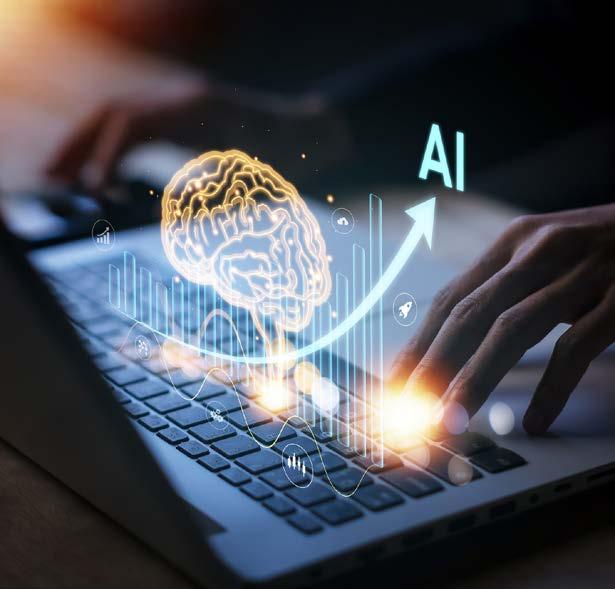

1. Editorial
2. Introduction (35 years of digital and remote experiences)
3. Institutional Strategy for Digital Education
4. Impact of educational innovation
4.1 Educational innovation in numbers
5. Impact of digital education
5.2 Digital education in numbers
5.3 Education for life in numbers
6. Innovative and digital educational experiences at the institution
6. 1 School of Architecture, Art, and Design
6.2 School of Social Sciences and Government
6.3 School of Humanities and Education
6.4 School of Engineering and Sciences
6.5 School of Medicine and Health Sciences
6.6 Business School
6.7 High School
6.8 Continuing Education
7. Educational experiences with Artificial Intelligence
8. Initiatives and drivers of innovative digital educational experiences
8.1 Adaptive Learning
8.2 Immersive learning with Extended Reality
8.3 Curricular and Alternative Credentials
8.4 Teacher development and educational innovation
8.5 Educational technologies ecosystem
8.6 Innovative educational spaces
8.7 Internationalization
8.8 Laboratories, software and digital information resources
8.9 NOVUS Projects
8.10 Educational trends and innovative techno-pedagogical experiences
9. Our educational innovation and digital education, in the world
9.1 Publications
9.2 Acknowledgments
10. Credits and acknowledgments
11. Appendices
Educational
and Digital Education at Tecnológico de Monterrey. 2023
In a constantly evolving world, education currently finds itself at a crossroads. Technological advancements have burst into our lives in ways never imagined, and education cannot stay behind.
Today, at Tecnológico de Monterrey, we proudly present our “Educational Innovation and Digital Education Report 2023”, a document reflecting our vision and commitment to educational excellence in the digital era.
Without a doubt, educational innovation is at the heart of our approach. We have implemented advanced technologies, such as Artificial Intelligence and Extended Reality, to enrich learning experiences. Likewise, our teachers have adopted innovative pedagogical methods that encourage active student participation and the acquisition of 21st-century skills, such as critical thinking and problemsolving.
Our mission is to offer innovative education that lives up to the demands of an increasingly interconnected and digital world, thereby empowering our students to be the leaders of the future. Through digital training programs, mentoring, and research opportunities, we provide them with the tools necessary to excel in a competitive and constantly changing world. At the same time, we promote inclusive education that reaches all corners of our society, reducing gaps in access and opportunity.
This report is a testament to our commitment to excellence, equity, and preparing our students for a digital world. It reflects the tireless efforts of our educational community to create meaningful and compelling learning experiences.
Lastly, we cannot fail to mention that in 2023, we celebrated 80 years of existence, and in 2024, we celebrate 35 years of offering digital education. We have come a long way, but we are determined to keep moving forward, innovating, and leading the way in educational transformation.
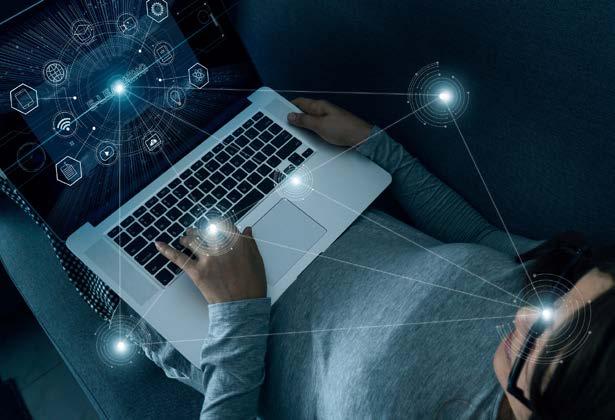
At the Tecnológico de Monterrey, we believe in the power of education to change lives and shape the future. We are excited about the future and committed to pushing boundaries and exploring new ways of learning. Together, we will keep building a better tomorrow.
Higher education is experiencing an era of unprecedented innovation. Each new year, we are faced with educational challenges and amazed by the solutions provided by innovative technologies and pedagogies, coming up symbiotically and naturally with a new word in 2023: «technopedagogy».
What have we learned from the past, what are we experiencing in the present, and what surprises does the future hold?
Tecnológico de Monterrey has always been at the forefront of this constant discovery and adaptation journey. In 2024, with a sense of deep pride and satisfaction, we celebrate 35 years of excellence in digital and remote experiences that

have revolutionized how we teach and learn at our institution.
Throughout the decades, Tecnológico de Monterrey has demonstrated its unwavering commitment to educational quality and the vision of preparing its students for the challenges and opportunities of a constantly changing global and technological world. Our history of educational innovation began in 1989 with the launch of the Interactive Satellite Education System, a program that allowed distance learning using emerging technologies. This milestone marked the beginning of a revolution in education that was pioneering in Mexico and set an international standard for distance and online education.
In these 35 years, we have evolved, learned, and grown in ways we never imagined in our first steps in distance education. We have adopted innovative technologies, transformed our pedagogical methodologies, and expanded our reach to students throughout Mexico and the world. We have provided learning opportunities to people who would have otherwise faced insurmountable barriers to obtaining a quality education.
Today, we can say that our vision of digital education goes beyond the transfer of knowledge; it focuses on the comprehensive development of individuals, the training of leaders, and the promotion of critical skills for the 21st century. Throughout these three and a half decades, we have achieved remarkable successes, faced challenges with determination, and, most importantly, transformed lives.
For all the above, this report is a tribute to our past achievements as well as a look toward the future. It reflects our continued commitment to leading educational innovation, empowering students of all ages and backgrounds, and adapting to an everchanging world. We celebrate these 35 years with gratitude, and at the same time, we look forward with enthusiasm, knowing that the best is yet to come.
Therefore, we invite you to learn about our initiatives and results achieved in 2023, which will open doors to knowledge and the human flourishing of thousands of our students worldwide. Together, we will continue to build a brighter, more accessible tomorrow for all.


First, we would like to share with you our Institutional Strategy for Digital Education, whose objective is to define the criteria, processes, and enablers (ecosystem) for the deployment of digital education in undergraduate and graduate programs through educational units, courses, programs, and experiences characterized for their quality and innovation, as well as for ensuring added value for learning.

In our constant search to improve the quality of education and the scope of our projects and initiatives, we have compiled significant data and numbers that shed light on the profound impact of educational innovation at Tecnológico de Monterrey. You will also learn about the results of our digital education programs and their influence on continuing learning.
Because educational innovation and digital learning are drivers of transformation in all our schools and programs, our institution is proud to offer innovative educational experiences that transcend traditional boundaries. Whatever your area of interest, we invite you to explore how we redefine education. Discover how we embrace technology, creativity, and a passion for learning, preparing our students for a challenging future.
Likewise, we invite you to learn in detail about our initiatives and drivers of innovative digital educational experiences. You will find a wide range of topics ranging from adaptive learning to the most innovative educational trends. Discover how we harness the power of emerging technologies, create innovative educational spaces, and foster internationalization in our pedagogical practices.
On this occasion, for the first time in our reports on educational innovation and digital education, we invite you to learn how we have incorporated Artificial Intelligence into the educational process, once again reconfiguring the traditional paradigms of knowledge acquisition. We share with you how we use
techno-pedagogy with AI to design innovative educational resources and how we prepare our teachers and students for the future through research, case studies, and developing special projects.
Our educational innovation and digital education impact is not limited to our classrooms but extends globally. Learn how Tecnológico de Monterrey has made its mark worldwide through certifications, publications, and recognitions. Our international prestige results from our constant commitment to excellence and significant educational contributions.
In the following pages, we invite you to discover how our vision has shaped the future of education and how committed we are to continue leading the way toward quality, accessible teaching adapted to the demands of a constantly evolving world. Welcome to the report on the educational revolution that we experienced during 2023! Let this be a sample of what happened during an entire year of educational innovation and digital education at Tecnológico de Monterrey, as well as a glimpse and a promise of the exciting challenges and opportunities to come.
Tecnológico de Monterrey, with 80 years of history in higher education, is recognized today as an innovative and cutting-edge institution in Mexico and the world.
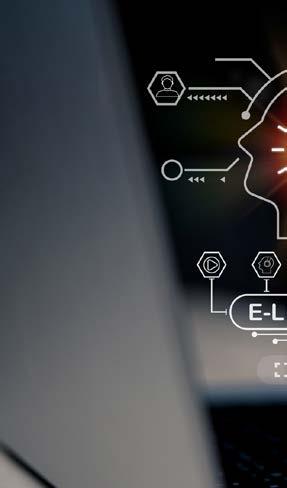
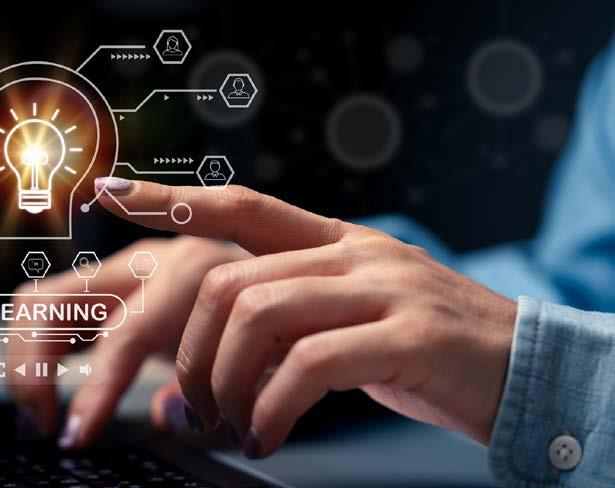
Part of this distinction comes from its constant commitment to incorporating new pedagogical methodologies and innovative technology to enrich its educational model.
Aligned with this vocation, for more than 35 years, Tecnológico de Monterrey has formalized actions to promote digital education in its High School, Undergraduate, Graduate, and Continuing Education educational programs. Several initiatives have been designed and implemented for learning in a distance modality and hybrid and face-to-face programs enriched with technology during this trajectory.
Derived from the institutional experience and the learning obtained during the COVID-19 pandemic, in September 2022, a process to redefine the digital education strategy in the institution for the following years began. The definition, vision, and strategic objectives were generated, and priority projects for the following years were identified.
At Tecnológico de Monterrey, digital education is the intentional, systematic, and conscious application of innovative techno-pedagogy in the digital learning experiences generated throughout the student’s journey. Digital education goes beyond distance courses since it also integrates digital learning experiences in face-to-face courses and at different moments of student life, where students learn using technology.
Tecnológico de Monterrey aims to be recognized nationally and internationally for its leadership in quality Digital Education.
To achieve this, it must ensure the best digital learning experiences based on the use of technology that offers value to the learning of all students throughout their student life.
To be an institution recognized for its quality education. Strengthen and grow digital learning experiences within the Tec community.
Offer a personalized digital learning experience.
Expand the global presence of the institution.
Promote inclusion and accessibility.
1. Build a portfolio that integrates learning experiences, face-to-face, mixed and distance educational units (EU)*, as well as academic programs in digital modalities.
2. Support teachers in developing the necessary competencies to deploy the portfolio with the offer of educational units, programs, and digital experiences.
3. Develop innovative educational solutions that ensure deep and lasting learning in students.
4. Design and implement the spaces and processes facilitating this digital education on all institution campuses.
*A educational unit is made up of learning activities with academic credit that a student carries out under the guidance of a teacher, as well as those carried out independently. The educational units with academic credit can be: Blocks, Tec21 Courses and Tec Weeks.
For an adequate deployment of digital education, it is essential to have guidelines, guides, quality criteria, and clear definitions of the digital modalities offered in the institution. The documents developed for this purpose are the following:
1.1 Definition of guidelines and premises that guide the National Schools to deploy Undergraduate and Graduate digital education through digital learning experiences, educational units, and academic programs.
1.2 Framework of eligibility of subjects in digital formats to ensure that the curricular structure and the identification of the subjects that may be eligible in digital modalities are determined in face-to-face programs for their relevance, quality, and value of the modality in the learning of each academic program, both at the Undergraduate and Graduate levels.
Using this framework, the educational units fit for teaching in a digital modality can be defined at the curriculum design level:

1.3 Eligibility framework for digital modality programs is a support tool to determine if a program can be offered in a digital modality, considering its relevance, quality, and value of the modality in said program.
1.4 Criteria to guarantee the planned, conscious, and intentional integration of digital learning experiences within the study plans and throughout the student’s journey.
On the other hand, an instrument for evaluating digital competencies was designed and applied to more than 1,000 teachers to determine teacher training needs and integrate them into the faculty’s development plan.
The Teaching Hub digital space was created, containing more than 300 innovative teaching resources and strategies for self-managed use by a teacher.
















Source: https://tecmx.sharepoint.com/sites/TeachingHub








An analysis of pain points and distinctive elements of the digital modality was conducted, from which a series of pilots and deployments were designed throughout the year, which are detailed in the following pages.
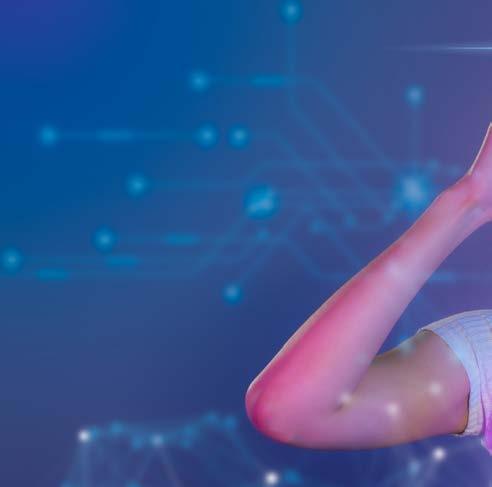
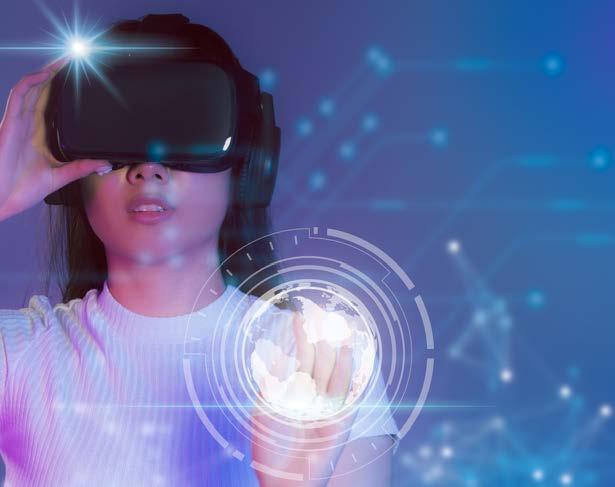
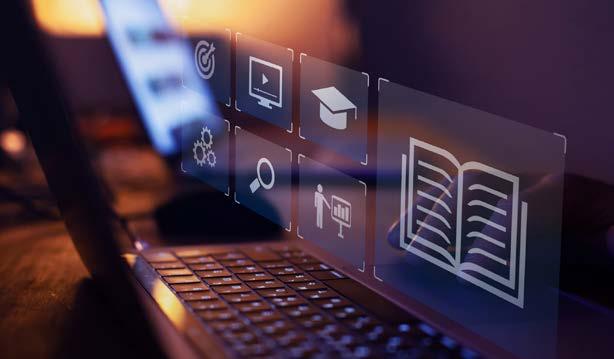
As a result of the strengthening of educational innovation and digital education, during 2023 there was an increase of more than 40% in the number of projects implemented by the National Schools, through different institutional initiatives. A total of 446 innovative and digital education projects were registered, with the participation of 670 teachers, and impacting more than 50,000 High School, Undergraduate, Graduate, Continuing Education and LiFE students.
Of the 446 projects developed in distance, mixed and face-to-face modalities, 402 are linked to a training unit, while 44 are related to educational innovation to impact the students’ experience positively.
Below are the impact indicators in 2023.
Impact of educational innovation and digital education
446
201 670 53,725
*Students who participated in more than one innovative and digital experience.
at Tecnológico de Monterrey. 2023 Report
The incorporation of significant changes in the teaching-learning process of students through educational innovation and digital education initiatives has made it possible to transform pedagogical, technological, and educational experiences. The promotion and management of innovative experiences have also been a priority.
The following graph shows the distribution of innovative and digital projects in 2023, according to educational innovation categories.
Projects based on educational innovation categories
The impact of educational innovation and digital education implemented by teachers at the National Schools, Continuing Education, and LiFE increased the quality of the teaching-learning process for the construction of positive emotions and the enrichment of new learning experiences for Tecnológico de Monterrey’s students.
The following graph shows the number of educational innovation and digital education projects developed by the National Schools, Continuing Education and LiFE during 2023. It should be noted that some of the projects impacted more than one school.
The adjustments generated by educational innovation in the teaching-learning process caused significant changes for the transformation, transparency, efficiency, improvement and quality of the education offered by the National Schools, Continuing Education and LiFE, through the different delivery modalities.
The following graph shows the promotion of educational innovation and digital education by the National Schools, Continuing Education and LiFE, based on the categories of educational innovation during 2023. It should be noted that some of the projects impacted more than one School or institutional initiative.

by School, Continuing Education and LiFE based on educational innovation categories
In 2023, several components of educational innovation and digital education were incorporated into the different academic levels, Continuing Education and LiFE, taught in distance, mixed and face-to-face modalities. The following graph shows the number of projects and delivery modalities.
Projects by academic level, Continuing Education and LiFE, and delivery modality

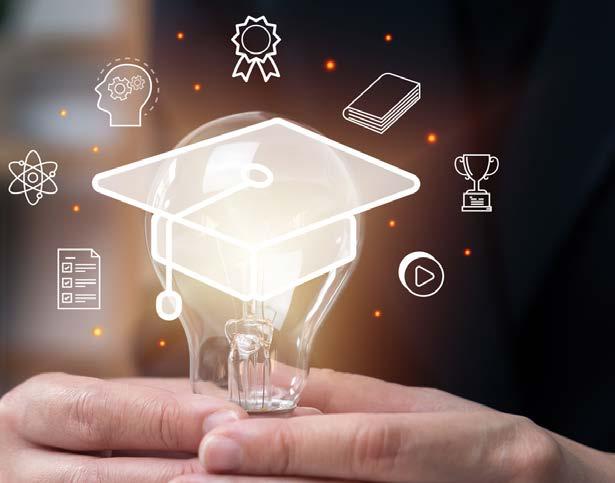
Digital education at Tecnológico de Monterrey is an institutional strategy that ensures meaningful learning experiences for its students by applying innovative pedagogies that integrate digital media and technologies.
During 2023, different modalities of digital education were taught, opening the possibility of offering meaningful learning experiences in different environments. The impact of these experiences is presented in the following pages.
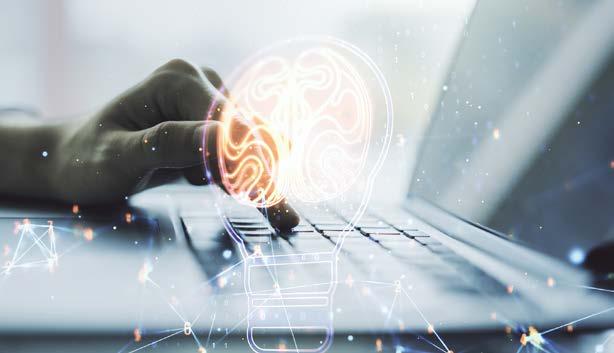
During 2023, the digital education initiative was consolidated as a relevant institutional strategy, allowing meaningful learning experiences to be provided to students inside and outside the classroom.
Below is the students-course list enrolled in groups by digital modalities, according to the different study levels.
*Incluye Profesional, Posgrado y Preparatoria
Face-to-face Digital % that is digital
*Includes Undergraduate, Graduate and High School.

4,965
1,620 TEACHERS
SUBJECTS
2,198 GROUPS
Source: SAP BO DWH Escolar, January-December 2023 period. Data includes Undergraduate, Graduate and High School.
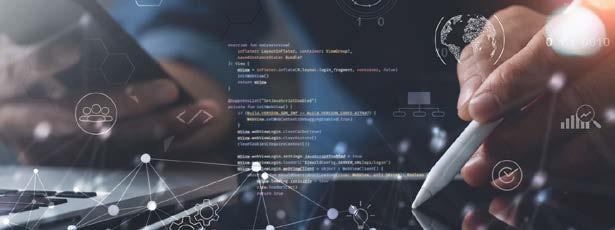

Students-course per School and modality, at High School and Undergraduate programs

3,710
1,108 TEACHERS
SUBJECTS
1,759 GROUPS
High School
178
SUBJECTS
66 GROUPS
33 TEACHERS
Source: SAP BO DWH Escolar, January-December 2023 period.
Tecnológico de Monterrey offers a wide variety of complete Graduate programs in digital modalities. In 2023, 38 Master’s programs were offered. Below is the distribution per School:
The list of online Master’s degrees can be consulted at: https://maestriasydiplomados.tec.mx/maestrias-en-linea
Distribution of Master’s students enrolled in face-to-face and digital programs*
7,715
Face-to-face: 2,295
159
*Data of the student-persons enrolled in each modality.
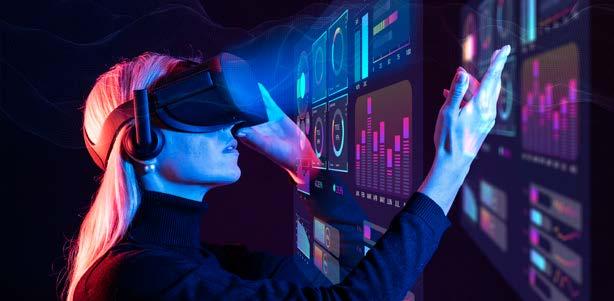
*Data of the student-persons registered in each modality and School.
In 2023, 458 students graduated from digital programs, resulting in a cumulative total of 37,956 graduates.
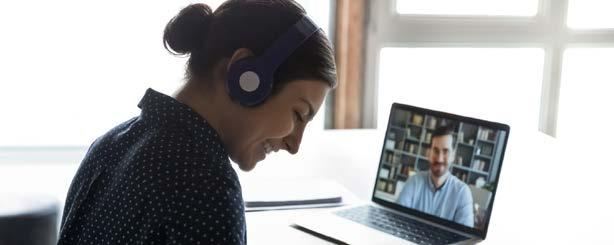
The Education for Life offer encourages lifelong learning, at any time and in all possible ways, including formal courses or self-taught education. This constant preparation of people is essential for comprehensive development in all aspects of life, and to be able to meet the challenges of ever-changing labor markets. Below are the different programs that Tecnológico de Monterrey offers as part of Education for Life.
In 2023, the Digital Continuing Education offer was consolidated as The Learning Gate, an innovative, high-impact learning ecosystem, with a flexible and ondemand model.
In March, phase 2 of content production was completed in The Learning Gate, with 270 competencies and subcompetences on the market, conglomerated in 11 learning trajectories on the topics of: Leadership, Data Science, Finance, Marketing and Sales. This portfolio represents +2,000 hours of learning and includes +20,000 learning resources.
In June, TLG Generation and TLG Flex were launched on the market, within The Learning Gate:
At TLG Generation, the learner has the possibility of having strategic support to promote their development, as well as a generation with whom they can connect and share knowledge.
Additionally, the learner has live advisory sessions with experts before each application challenge.
In TLG Flex, the learner has all the flexibility to advance their career at the pace they consider.
In November, industry badges were added to The Learning Gate’s offering, launching the “IBM Data Science Practitioner Certificate”, “Microsoft Certified: Power BI Data Analyst Associate” and “Cisco Data Analytics Essentials” programs.
For more information about the new programs, consult the section on innovative and digital educational experiences at the institution, corresponding to Continuing Education.
Below are the most notable numbers during 2023:
81% of the offer of catalog courses in digital format (339)*
18% of the students enrolled in catalog courses are EXATEC
55% of the course offering for companies was in digital format (339)
89% of students enrolled in business courses take them in digital format (94,451)
1,261 teachers
60,565 certificates granted
85 Net Promoter Score (NPS)** in digital catalog courses and 88 NPS in business courses
Notes:
*A catalog course is a course open to the general public.
**Net Promoter Score has a scale of -100 to +100. Source: Planning and Effectiveness Directorate of the Vice-Rector’s Office for Continuing Education. Data until December 2023.
MOOC (Massive Online Open Courses) are of great importance at Tecnológico de Monterrey due to their strong impact on universal distance education, as a tool for attracting students and as an alternative offer of Continuing Education, accumulating 192,491 enrolled students during 2023. Among the distinctive characteristics of MOOC, their asynchronous format and the possibility that the participant can obtain a verified digital certificate stand out.
Below are the most representative numbers in 2023 for the Coursera, EdX and bootcamp platforms, both from the general public and the Tec community, including students and collaborators from the institution.
Coursera
151,153 enrolled students
88 active courses, of which 7 are new
20 specialized programs
105 teachers
37.8% students completing courses
4.8 satisfaction index*
Note:
*The satisfaction index is measured on a scale of 0 to 5, where 5 is the highest score. Data up to December 2023.
EdX
41,239 enrolled students
91 offering options
74 courses
4 micro-masters
13 undergraduate certificates
Source: Department of Alternative Credentials. Data up to December 2023.
Bootcamps
99 enrolled students
3 bootcamps

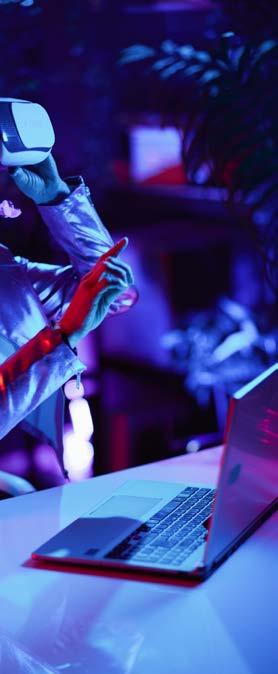
These programs seek to promote social inclusion and equality through social impact and transformation to improve quality of life, promote the sustainable development of communities, and reduce educational lag in Mexico and Latin America. In this sense, Tecnológico de Monterrey offers the following distance social programs: Prepanet and Virtual Learning Center.
Likewise, in 2023 the alliance between Tecnológico de Monterrey and the BBVA Foundation was consolidated to extend the reach of the “Supérate” initiative, which provides the opportunity to level up knowledge and skills for middle and high school students through a personalized training path.
This is a program that offers online High School education, of high academic quality, focused on people from situations of social inequality. Below are the most representative results of Prepanet obtained during 2023:
3,046 students (1,219 new entrants)
21,611 students-course
31 courses
5,944 graduates
1,810 undergraduate students who participated as tutors in their social service
Source: National Directorate of Prepanet. Data up to December 2023.
This social program promotes access to quality education through a virtual learning community; provides training through educational resources and free courses, as well as through the Network of Community Learning Centers (CLC). The CLC are physical spaces where girls, boys, young people and the community in general, mostly from isolated areas, in progress, with limited general resources and lacking educational resources, go to develop skills and abilities to continue with their academic studies, undertake or enter the job market.
Their portal Virtual Learning Center, registered 547,455 visits in 2023, adding a total of 16,673,200 visitors from 2011 to date. The center offers two types of courses: one self-study and another with academic follow-up. In the latter, the student receives support from a teacher and tutor in their learning process. During 2023, 17 teachers and 94 students of undergraduate careers from the Tecnológico de Monterrey participated as tutors, as part of their social service, adding up to a cumulative total of 389 teachers from the institution and 5,777 students to date.
Here are the most representative results of the work carried out in this center during 2023.
Self-study
4,112 students
Accumulated number of benefited students: 492,315
100 courses
Accumulated graduates: 1,781
Academic follow-up
120 students
Accumulated students: 259,613
16 courses
43 students completed the program
Accumulated graduates: 78,023
Source: Directorate of Education for Development, School of Humanities and Education, of the Tecnológico de Monterrey. Data up to December 2023.
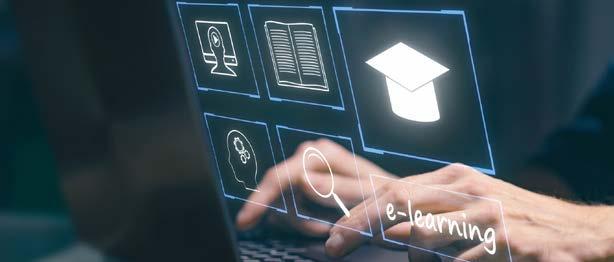
Tecnológico de Monterrey, in collaboration with the BBVA Foundation, developed this online platform. It was designed as a learning ecosystem that provides the opportunity to level knowledge and skills to middle and high school students based on a diagnosis that identifies areas of opportunity to create a personalized training path.
Its general objective is to reinforce students’ academic, psychological, and socio-emotional development in a fun and accessible manner so they can achieve academic success.
The areas of knowledge on the platform are verbal reasoning, mathematical thinking, school persistence, psychological capital and emotional intelligence, and leadership.
The platform has a section for teachers, offering educational resources to reinforce mentoring skills and more information about the content their students will review on the platform. Additionally, it is possible to create groups to monitor the academic performance of a class and have a virtual classroom that allows communication and sharing of additional educational resources for students.
Initially, “Supérate” was focused only on BBVA Foundation scholarship holders, but in 2023 the alliance was formalized with Tecnológico de Monterrey to extend its reach to the community in general. During 2023, the platform impacted approximately 150,000 students.
Source: https://www.superateconfundacionbbva.mx
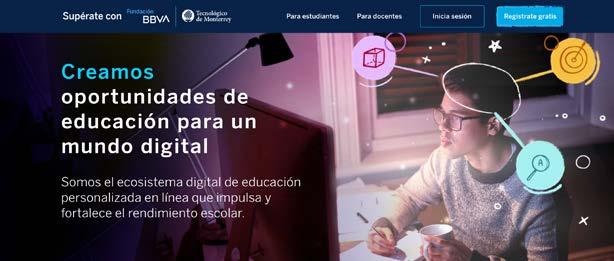

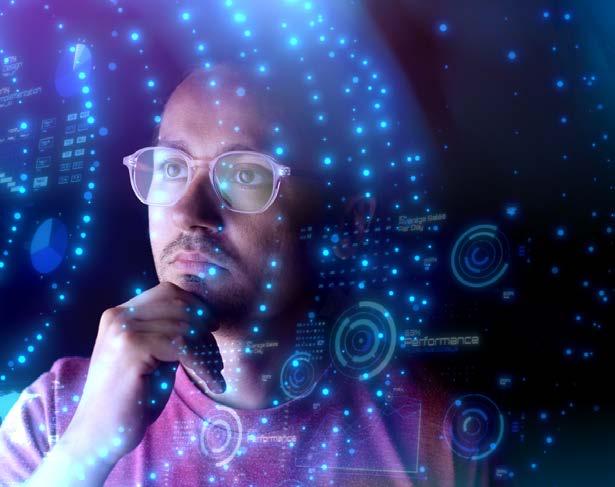
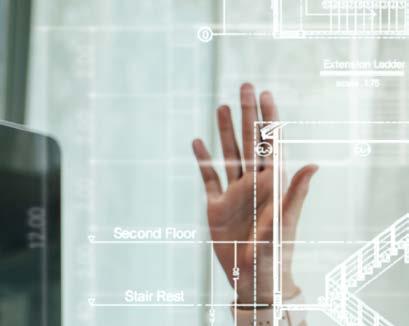
The four disciplines (Architecture, Art, Design and Urbanism) that the School brings together, are characterized by their ability to propose creative solutions and carry out multidisciplinary projects.
In 2023, the teachers of the School of Architecture, Art and Design generated different strategies inside and outside the classrooms, in different sociocultural contexts and even in the Tec Virtual Campus educational multiverse, with the aim of enriching the students’ learning processes.
The following educational innovation and digital education projects show an intersection between the use of various Artificial Intelligence tools and traditional educational techniques. This intersection has allowed us to generate a more dynamic learning ecosystem, as well as overcome some geographical barriers. Thanks to these efforts, it has been possible to offer high-value experiences for students, also enriching them with the involvement of different actors from society in real life.
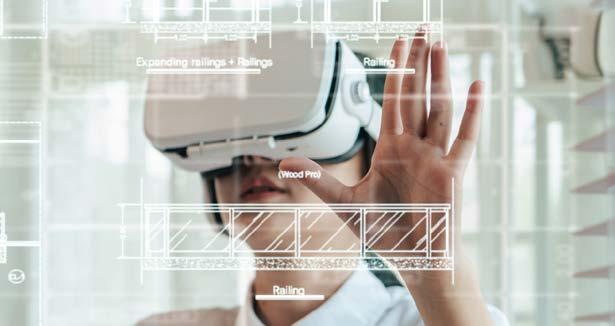
Virtual experiences and traditional impact dynamics
Development of emerging housing projects for vulnerable groups through a mix of multiple dynamics and approaches (social impact + UN SDG + inspiration + Active Learning + teaching techniques + class dynamics).
The project was developed in the educational unit “Innovation and creative processes”.
Impact
243 students from the Mexico City Campus
Designer teacher
Ricardo Aguayo
Tenso structures
Carrying out a “wail” with resources shared by the entire group of students, with the aim of helping them identify the materials used in its preparation.
The project was developed in the educational unit “Modeling of Physics in the built environment: Statics”.
Impact
107 students from the Mexico City Campus (August-December 2023)
Designer teacher Jorge A. Alcérreca
Development of products with recycled material for Walmart, in collaboration with the INVOMEX Industrial Group (investor) and REINCO (eco-petrochemical) with a technological and business focus.
The project was developed in the educational unit “Design, innovation and technological entrepreneurship”.
Impact
31 students of the Monterrey Campus (August-December 2023)
Designer teachers
Alejandro Vázquez
Ángel M. Gutiérrez
Hiram J. Uribe
Jorge A. Garza
José E. Grimaldo
Developed in the subject “Final degree project”, it questions whether the space should be intervened in the future, under a multidisciplinary vision and exploration of cutting-edge topics through telling complex stories and narratives.
Impact
28 students of the Puebla Campus (February-June 2023)
Designer teachers
Anabel P. Barreda
Daniel Savedra


Creation of a Goldberg machine, with the support of the Gadgeteer game and physical resources. From this experience, the students identified the relevance of communication between the physical and digital world, as well as the importance of experimentation and creativity in any discipline and profession.
The project was developed in the educational unit “Immersion and creative experimentation”.
Impact
81 students of the Mexico City Campus (February-June 2023)
Designer teacher
Octavio Méndez
The students developed a monograph of an architectural work, narrating and describing it from the format of a comic with the support of software resources.
The project was developed in the educational unit “The conceptualization of space, its theory and its history.”
Impact
46 students of the Puebla Campus (August-December 2023)
Designer teacher
Fernando Curiel

The general objective of the stay was to develop a research focused on studying the use of markers, markers and similar, as a tool to enhance the skills and attitudes of design students.
The project was developed in the “Research Stay” educational units.
Impact
2 students of the Monterrey Campus (August-December 2023)
Designer teacher
Juan C. Rojas
Practice in the Mozilla Hubs interaction space. The project was developed in the educational unit “Visual and sound culture”.
Impact
75 students nationwide (AugustDecember 2023)
Designer teachers
Alejandro Acuña
Paola I. Gámez
Piedad Martínez
Immersive educational experience focused on the UN SDG Health and Wellbeing, in which students explore the concept of health, questioning whether physical inactivity can be considered a disease. The resource guides students towards self-reflection, encouraging them to select physical activities to do at home, promoting healthy habits.
The project was developed in the educational unit “Innovation and creative processes”.
Impact
331 students nationwide (February-December 2023)
Designer teachers
Esmeralda Niño
Horacio I. Rodríguez
Laura P. Zepeda
Marcela Romero
Marcos G. Gallardo
Martha E. Núñez
Rebeca E. Alvarado
Rocío E. Cortez
The Class tool was used to generate an interactive virtual environment. Teachers and students accessed functionalities that enriched the distance educational experience, synchronously. This experience allowed us to use and test innovative strategies such as gamification, through the use of stars visible to all students, providing a playful and motivating touch to educational activities.
The project was developed in the educational units “Innovation and creative processes”, and “Conceptualization of space, its theory and its history”.
Impact
61 students nationwide (February-June 2023)
Designer teachers
Lilian Salazar
Rebeca E. Alvarado
Innovative educational experience based on telepresence that recreates the natural dynamics of in-person environments through the use of technology that simulates a hologram effect.
The project was developed in the educational units “Application of design in entrepreneurial projects” and “Regenerative design”.
In this project, questionnaires and Virtual Reality resources were used to improve Architecture projects.
Impact
51 students of the Monterrey Campus (FebruaryDecember 2023)
Designer teachers
Diana L. Riveral
Linda E. Ruiz
Impact
25 students of the Monterrey Campus (FebruaryJune 2023)
Designer teachers
Juan L. Higuera
Luis F. Villarreal
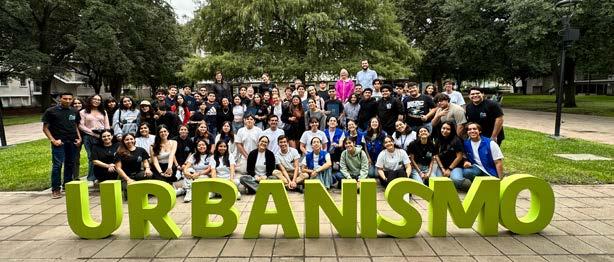
Other successful projects or experiences related to educational innovation and digital education during 2023 are presented below.
This platform powered by Artificial Intelligence (AI), aims to simulate educational dialogues, fostering a conducive learning environment through emotional recognition and regulation. It begins with a board game that recreates feedback scenarios so that teachers or students identify emotions, reflect on themselves, and develop more meaningful responses. These responses are then input into a natural language processing AI tool. This AI component identifies emotions and transforms them into visual representations of emotional tonality, helping people adjust their speech to align with their preferred pedagogical approach. This innovative platform leverages AI to improve educational dialogues, fostering a more receptive attitude towards learning, through emotional awareness and response refinement. The project started in 2022 and was the best evaluated NOVUS project; currently participates in Reimagine Education. The AI platform has identified 7,309 emotions and the teachers who have used it have improved their students’ opinions by 9%.
Through the design of a board game (in person), we sought to develop in students a better understanding of what urban planners do. The game integrates the representation of different roles within the planning of a city, the development of current problems that cities face, and a bank that allows measuring the economic impact of its proposals. As students get involved in the game, they can better develop the “Social Responsibility” competency. In a second edition, Artificial Intelligence was incorporated to make the role-playing experience more meaningful and allow for a deeper understanding of the complexity of public participation. Both the social responsibility competence and the game experience are measured with validated scales to be able to analyze the results and improve the quality of the experience in subsequent editions.
Impact
445 students of the Querétaro Campus (February-June 2023)
Designer teachers
Eduardo D. Juárez
Ivo N. Ayala
José M. Velázquez
Lilia C. Rodríguez
Mariana Maya
Impact
295 students of the Monterrey Campus (February-June 2023)
Participating teachers
Ana S. González
Edgar H. Macías
Julia K. de la Garza
Karen Hinojosa
Talía González
In this project, a monologue developed with the ChatGPT Artificial Intelligence tool was performed. It was produced with the animation technique of capturing body and facial movement with a cell phone camera. Hyperrealistic metahuman characters and scenarios were created with the UNREAL ENGINE video game engine. The students had the opportunity to receive two Master Classes for character development and interpretation through acting.
In this workshop, participants developed tangible objects from countless possible worlds. For the first time in all its global editions, The Futures Bazaar México was carried out in a hybrid manner involving more than 150 students, professors and professionals from 7 campuses (Mexico City, State of Mexico, Guadalajara, Monterrey, San Luis Potosí, Northern Sonora and Toluca). The futurist Stuart Candy, and the leader of the Futures Design Lab in Monterrey, Yadira Ornelas, participated as speakers. In each of the participating campuses, teachers from the school supported by guiding the activities that were carried out locally. As part of the results of this experience, more than 50 speculative design products were developed, exploring different possibilities of the future, which invite us to reflect on current practices.
Impact
45 students of the Guadalajara Campus (AugustDecember 2023)
Participating teachers
Andrés E. Santin
Copatzin E. Borbón
Imelda Asencio
Jesús G. Félix
Impact
132 students from the campuses: Mexico City, State of México, Guadalajara, Monterrey, San Luis Potosí, Sonora Norte and Toluca (February-June 2023)
96 external participants (February-June 2023)
Participating teachers
Christiam I. Mendoza
David Sánchez
Edgar P. Martínez
Elva Y. Ornelas
Guillermo Gutiérrez
Inés Álvarez
Lucero D. de la Huerta
Luis A. Gil
Rubén Vázquez
Xóchitl del C. Arias
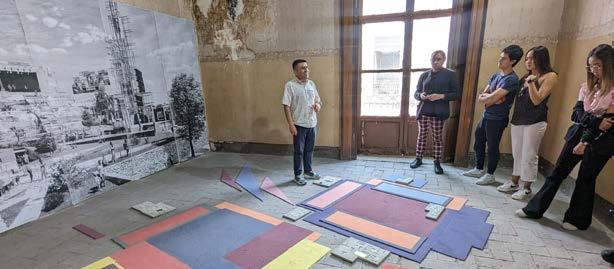
As part of the concentration in Advanced Architecture, the “Xcaret Chair” was held in which students of the Architecture program developed a challenge in collaboration with the training partner and their Design and Innovation department, operated by EXATEC. Considering a hypothetical site and conditions alike, the project seeks to explore ideas for the “park of the future,” from which documents, experiments and technologies emerged that allowed new experiences to be visualized.
Led by the director of the Department of Innovation and Parks, several teams of 6 members developed the project. Between trips, experiences and other learning, protected by an official confidentiality agreement, the chair allowed students to develop the exploration of a real exercise from a multidisciplinary perspective.
Likewise, a contest was held where group mentors guided the student teams. The best ideas and narratives were presented at the Interactive Urban Museum, and the selected ones were presented to the Council of the training partner.
The chair was integrated as part of the different Architecture workshops held over the last 5 years at Campus Puebla, also commemorating the sixth anniversary of these conversations between the training partner and the Department of Architecture of this school at the Tecnológico de Monterrey.
Impact
20 students of the Puebla Campus (February-June 2023)
Participating teachers
Ángel Morúa
Daniel Savedra
Edgar O. Espinosa
Fernando Curiel
José A. Sáenz

The School of Social Sciences and Government has promoted innovative education highlighted by milestones such as Global Vision Tec Week, a space for interdisciplinary dialogue. Additionally, the use of Artificial Intelligence in Law learning and the Global Classroom experience have transformed the way students explore, understand and engage with the world, fostering a global vision and practical key skills. These examples evidence a commitment to academic excellence and bold preparation for an ever-changing world.
Global Vision Tec Week was consolidated in 2023, as one of the great educational innovations of the School of Social Sciences and Government. By combining academic talent and the use of innovative technology during a week of online teaching, a bridge has been created between Tec de Monterrey and universities around the world for coexistence and collaboration between students and teachers, as well as for sharing and present the most outstanding features of the Tec21 Model.
In its second year of implementation, the Global Vision initiative offered to students of different professional careers has established itself as a benchmark for innovation at Tecnológico de Monterrey, achieving 4 main objectives:
Perfect the educational initiative of Tec Week with the experience gained in the first year of delivery.
Escalate by incorporating new teachers from different campuses who teach the educational unit.
Make Tec Week known throughout the world, inviting new universities to participate.
Keep the course updated, allowing for constant interest in the topics and projects handled there.
With daily sessions taught from the Hall Immersive Room, Global Vision Tec Week is a course that revolves or teaches around the topic of inclusion, impacting more than 170 students (national and foreign) connected and participating in each of the sessions.
In the topic of educational innovation, it is as important to be able to execute and implement innovative ideas as it is to consolidate, mature and scale them.
20 Teachers from Tecnológico de Monterrey
754 Students of the Tecnológico de Monterrey
Participating foreign universities:
Universiti Kebangsaan Malaysia (UKM)
Catholic University of Salta of Argentina (UCASAL)
University of Notre Dame
Technological University of Colombia
7 Teachers from foreign universities
400 Students from foreign universities
24 Featured guests
“All I have to say is that it was maybe the best activity of the week and absolutely all members of the team were working very well, trying to meet each other and to know about the lifestyle of each one. So, I’m happy with that.”
Participant student
This project was led by the Western Region Law Department. Through Artificial Intelligence, Law students developed activities on the legalization of signatures and the apostille, through the use of ChatGPT and the Fliki software.
With the aim of identifying the benefits and limitations of using ChatGPT, the students designed the presentation script on the topic of legalization of signatures and the apostille, through prompts on private international law, to improve the initial script proposed by ChatGPT. Subsequently, the students used FLIKI, Artificial Intelligence software to create a video about the processes of legalization of signatures and apostille of documents.
To watch the video, click here.
Impact
25 students of the Guadalajara Campus (August-December 2023)
Designer teacher
Pedro A. Elizalde

Under the “Social learning and collaborative work” strategy, “Economics” students from the Mexico City Campus and the Autonomous University of Barcelona lived an international distance experience within the Global Classroom initiative.
For four weeks, the students developed multicultural work lasting 12 hours, both synchronously and asynchronously. During this time they solved a real problem within public or private environments, which involved the presence of moral risk and adverse selection, phenomena that damage the linkage of agents to institutions and markets, which impacts their development and the growth of countries.
With this experience, the students had the opportunity to experience a different perspective through cultural exchange between two educational institutions, thus allowing them to gain a deeper understanding of themselves and those around them.
In addition to the evaluation assigned by each participating educational institution, each student obtained a digital badge issued by the ViceRector for Internationalization of the Tecnológico de Monterrey, in recognition of their work in multicultural teams.
Impact
Students and teachers from the Mexico City Campus, as well as the Autonomous University of Barcelona (August-December 2023)
Designer teachers
Carlos de la Torre Hugo J. Fuentes
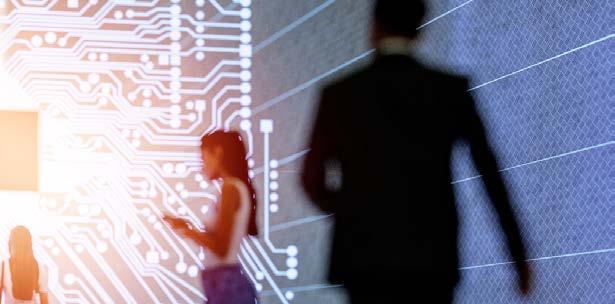
At the School of Humanities and Education, educational innovation has become the engine that enriches the teaching-learning process, to offer solid and memorable training experiences to our students. We merge critical humanism with applied technology, using digital culture tools to enhance the development of fundamental skills and competencies in our careers.
This year, we designed and implemented emblematic projects such as the “National Short Film Festival” and the “International Book Fair” in Monterrey, experiences that transcend conventional classrooms and immerse students in enriching environments, encouraging practical application and knowledge sharing. We also carried out cultural documentation experiences and “immersive adventures” of Virtual Reality, which
contribute to the dissemination of the cultural heritage of our country; all of this framed by the entrepreneurial spirit and social responsibility.
The School of Humanities and Education recognizes the positive impact of educational innovation on the comprehensive development of our students, as well as the indispensable work of teachers and collaborators, who play a crucial role in the design, development, implementation and evaluation of these experiences, thus contributing to providing training that transcends the classroom and prepares our students to successfully face the challenges of the current and future world.
Through these educational innovation projects, in addition to promoting the enrichment of educational experiences, they also contribute to the construction of a more promising and conscious future.
The work of those who participate in them is a testimony to the transformative capacity of education when it is nourished by innovation and the richness of the humanities and technology.

In June 2023, the second edition of the “National Short Film Festival” was held at the Monterrey Campus, as a leading national event in the exhibition and awarding of short films made by students of the Tecnológico de Monterrey, belonging to the Preparatoria y Profesional de all regions of the country.
This edition had as strategic allies the Mexican Academy of Cinematographic Arts and Sciences (AMACC), the FEMSA Foundation and DocsMX. Additionally, there was sponsorship from Coca Cola Sin Azúcar, and alliances with Cinépolis, Volaris, Sony and Harman Professional.
Impact
550 students and 57 High School and Undergraduate teachers
150 short films produced, in 7 categories
Designer teacher
Juan C. Olmedo (festival director)This is the most important cultural project in Northern Mexico, home of writers, artists and great leaders. It is considered a meeting point and space for discovery, as well as a trigger for curiosity: after all, a destination where culture grows and prospers.
From October 7 to 15, 282,949 visitors to the fairgrounds were registered, and 10,725 participants were registered online and in activities on other campuses. In an environment to stimulate the intellect and awaken the imagination, different experiences were conducted during these days to share moments of creativity, in addition to the love for literature.
Impact
285 students
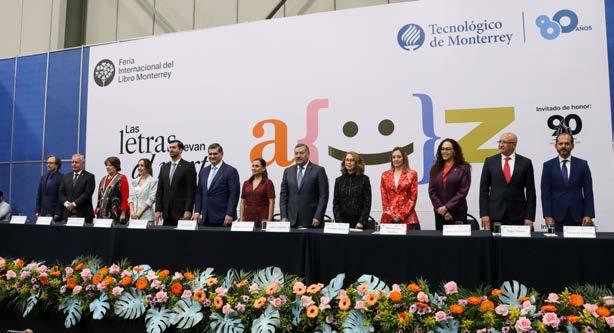
With the aim of rescuing the cultural heritage, specifically, the gastronomic heritage of the local environment, this documentary was produced that shows the origin, evolution and preparation of a typical dish from Toluca and/or its surroundings.
The students carried out both documentary and field research to know all the details of the selected dish. The documentary includes a description of at least 2 establishments that offer the dish, as well as a description of the dish itself, told by the owners of each establishment. Likewise, testimonies from some of the diners are presented. The above, with the purpose that the viewer knows and enjoys, in a virtual environment, the typical and traditional food of Toluca.
Impact
75 students of the Toluca Campus
Designer teachers
Julia B. Alcántara
Carlos G. Zermeño
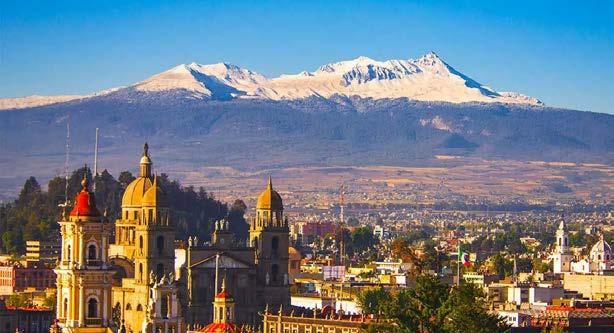
This is a methodology for scaling social entrepreneurship and complex thinking skills, through an entrepreneurial ideation process. The project started in 2022, evolved during 2023 through the development of different activities.
1. Web platform development. Based on the tests of this platform, two international presentations were generated at the 6 Conference On Future Education, held in Kuala Lumpur (July 2023).
2. Signing of two collaboration agreements, one with Fundación Santander to make SEL4C a MOOC, and another with Ashoka and Editorial Santillana to make an adaptation of SEL4C focused on primary education.
3. In the February-June 2023 semester, SEL4C serves as training partner of the “TC2007B Block” of the Mexico City Campus, for the development of a mobile application.
4. Implementation in groups in the Western Region, which allowed validating the methodology and generating academic publications related to this process. The validation was presented at the 15th International Conference on Computer Supported Education, held in Prague (April 2023).
5. In the August-December 2023 semester, SEL4C was implemented within the COIL-Global Classroom project, developed with the University of Concepción of Chile.
6. I work with the UniNavarra University Foundation of Colombia, to train their teachers in the implementation of SEL4C.
7. Two intellectual property registers and development of a new scientific and technological entrepreneurship methodology, with its own intellectual property register.
Impact
100 students from the campuses: Guadalajara and Mexico City
Designer teacher
José C. Vázquez


The project “A journey through Mexico” has the objective of strengthening the understanding and appreciation of the cultural heritage of Mexico in the teaching-learning process. Through the implementation of immersive Virtual Reality technologies, it is possible to bring students closer to the knowledge of national cultural heritage in an experiential and fun way, allowing them to experience other means of learning.
The results obtained in the educational units “Cultural Heritage of Mexico” and “Cultural Heritage of Mexico”, show a positive impact. The average score of the group in the nonimmersive activity was 78.17, while, with the implementation of the “A trip through Mexico” experience, the average score increased to 85.73. This indicates that the use of immersive resources, such as Virtual Reality, contributes to a greater depth of content and enhances student learning.
The survey applied at the end of the experience showed that the students positively valued the immersive experience, both in terms of their learning and the use of technology. It was concluded that the integration of Virtual Reality in the academic context generates an experiential relationship between students and their environments, and greater selfawareness of the process experienced during their learning.
Impact
452 students
Designer teachers
Adela Díaz
Bárbara R. Granados
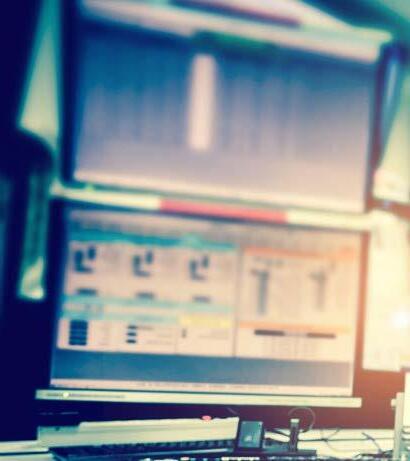
The School of Engineering and Sciences is convinced of the benefits of educational innovation and digital education in the teaching-learning process, and actively participates in its various categories to provide meaningful learning experiences to its students. Many of these experiences use cuttingedge technology and digital tools to enhance the development of disciplinary and transversal skills, as well as provide a memorable experience.

Among the diversity of projects implemented in 2023, those that integrate Artificial Intelligence, Virtual Reality, 360° Video, Adaptive Learning, Metaverse Tec Virtual Campus, and the topic of sustainability and circular economy, stood out. Relevant projects aligned with institutional initiatives were also implemented: Global Classroom, Hall Immersive Room, Elite Courses, and Professor with hologram effect.
Artificial Intelligence (AI) makes it possible to develop innovative teaching-learning projects and experiences. Some of the most representative ones are presented below.
This is a platform powered by Artificial Intelligence (AI), whose objective is to improve educational dialogues, fostering a conducive learning environment through emotional recognition and regulation. It begins with a board game that recreates feedback scenarios for teachers to identify emotions, self-reflect, and develop more meaningful feedback responses. These responses are then entered into a tool that uses AI with natural language processing.
This AI component identifies emotions and transforms them into visual representations of emotional tonality, helping people adjust their speech to align with their preferred pedagogical approach. The platform leverages AI to improve educational dialogues, encouraging a more receptive attitude towards learning through emotional awareness and improved feedback. To learn about the Smart Feedback project, you can access the application through the following link: https://smartfeedback.info
The project was implemented by the School of Engineering and Sciences, the School of Humanities and Education, and the School of Architecture, Art and Design, from the Guadalajara, Querétaro and Puebla campuses.
1,654 diagnoses of emotional tone were issued in the feedback, to:
912 students
509 unregistered users
230 teachers
3 companies
It should be noted that in these diagnoses, 6,074 emotions were identified in total.
The project was selected as shortlisted in the “QS Reimagine Education Awards 2023”, in the AI in Education category; In addition, there have been 6 publications and participations in international conferences.
Eduardo D. Juárez
Eduardo E. Larsen
Ivo N. Ayala
José M. Velázquez
Kenneth W. Bauer
Lilia C. Rodríguez
Mariana Maya
Patricia E. Alonso
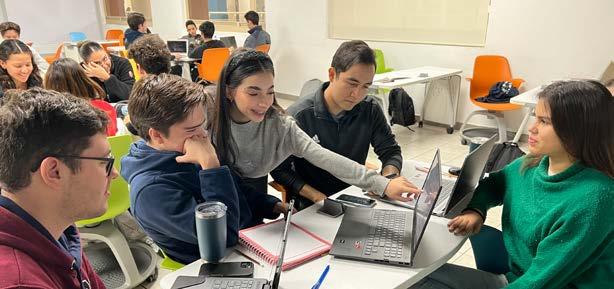
This project aims to evaluate the effectiveness of using ChatGPT to integrate critical thinking within disciplinary competencies. This approach is achieved by encouraging deep reflection on the course content from the perspective of critical analysis to detect cognitive biases, enriching the design and definition of solutions through various thinking, business and leadership techniques.
Through structured reflective activities, students are asked to analyze, enrich, select and apply ChatGPT responses. The idea is to use this generative AI tool to go beyond simple queries of disciplinary knowledge, guiding the analysis towards deeper reflection and expanding the spectrum of learning by incorporating knowledge from other different areas.
Impact
1,174 students and 20 teachers (August-December 2023)
Designer teachers
Alberto Aguilar
Ana R. Sanromán
Athena A. Flores
Blanca I. Maldonado
Carlos A. Ventura
Carlos Morales
Carmen D. González
Carmen R. Maldonado
Cosme E. Santiesteban
Enrique A. Sánchez
Faustino Bejarano
Gabriela I. García
Jesús R. Pájaro
Jorge Rodríguez
Juan A. Talamás
Leticia Lozano
Luis I. Bustillo
Luis M. Orona
Manuel Valencia
Raime A. Bustos
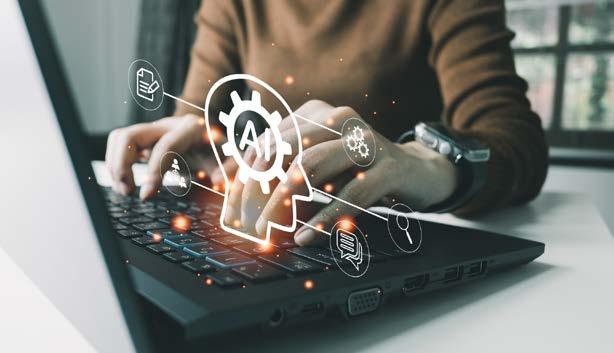
Traditionally, courses are evaluated with laboratory practices, experimental activities in class, and a final project. However, it has been observed that students cannot justify how they designed from the prototypes to the controller, leaving the operation of the prototype to the trial and error methodology. In this context, an interface was generated that allows detecting which points are omitted during the performance of the practice (information management), as well as exploring more than one solution to the problem (problem solving), and observing the level of interpretation of the results based on graphs or tables (critical thinking), by creating a chatbot. First, the chatbot is trained with a neural network where it is exposed to the correct procedure that the student must perform; then, depending on how far the student moves away from the ideal procedure, the chatbot will begin to generate advice and suggestions, as well as provide support material to successfully complete the practice in question.
130 students and 6 teachers of the State of Mexico Campus (January-June and AugustDecember 2023)
Designer teachers
Carlos A. Cruz
Héctor Cervantes
Jesús E. Chong
This methodology uses technology to personalize the learning process and its progress, and reinforce concepts and particular needs of the students. Below, a national strategy implemented in various educational units corresponding to the exploration stage in engineering programs is presented.
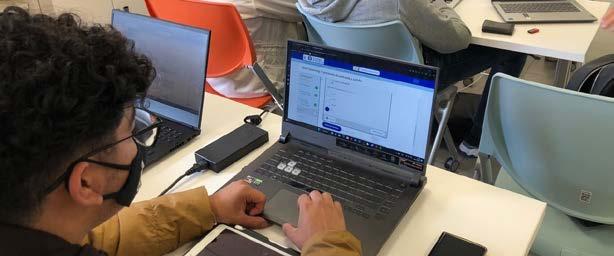
This strategy aims to personalize the learning path of the students, accompanying them with activities according to the level of knowledge, as well as the need to reinforce the skills and competencies that the educational units develop. This strategy was incorporated into the engineering exploration stage courses, which require high feedback and support in the learning process.
1,795 students and 90 teachers (February-June and August-December 2023)
Adriana Cantú
Alejandro García
Antonio J. Sánchez
Cristian González
Delia A. Galván
Diana D. Jiménez
Fabiola Uribe
Isaac Juárez
Ivonne Yznaga
Jorge Álvarez
José M. Pardo
Manuela Ortiz
María de los Á. Constantino
Miguel A. López
Omar Olmos
Oswaldo Monroy
Roberto D. Rodríguez
Rosa G. Paredes
Saúl Montes de Oca
Silvia González
Yolanda Martínez
Aware of the need for economic development, and seeking social balance and environmental protection, the School of Engineering and Sciences worked on educational innovation projects focused on the topic of “Sustainability and circular economy.” Below are some of the most notable ones.
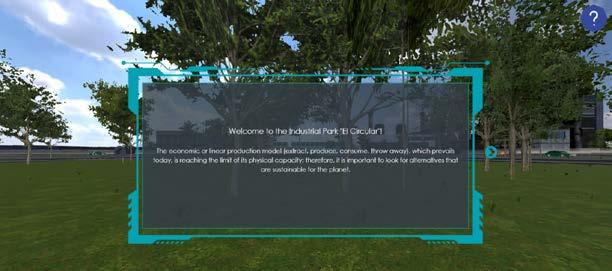
This is a virtual tour of a circular industrial park so that students understand key concepts about the circular economy.
It represents an industrial park that takes advantage of the waste of one company and uses it as inputs for the next, applying the concept of circular economy in its aspect of industrial ecology or industrial symbiosis. The resource is inspired by the Kalundborg industrial park in Denmark and several companies that are located in Mexico and have begun to carry out these practices.
Impact
180 students and 3 teachers on campuses: Aguascalientes, Monterrey and Querétaro (August-December 2023)
Designer teachers
Alfredo Santana
Andreas Koch
In the educational unit “Biomimetics and sustainability”, Elite digital modality, 360° videos were used, where students visit:
The Monterrey Soccer Stadium. Here you can see different spaces, such as the exterior, locker rooms, exit to the court and court. It is very useful for students to understand the different patterns of biophilic design.
The Santa Catarina Wind Farm. Through this resource, students can experience the sensation of being physically in this place, by listening to the noise that the wind turbines make when they move due to the action of the wind, being very useful for understanding the operation of a park. wind energy and its implications on the surrounding ecosystem.
Impact
575 students and 3 teachers (February-June and AugustDecember 2023)
Participating teachers
Elsy G. Molina Jorge A. Gutiérrez Mariana E. Elizondo
The students of the educational unit “Ecological processes for human development” participated in an Escape Room, testing their knowledge and skills to solve puzzles and achieve the designed challenge. At the same time, they reflected on climate change and its social, economic and environmental impact.
Impact
245 students (February-June and August-December 2023)
Designer teacher
Emilio Clarke
The School of Engineering and Sciences has developed a wide variety of resources that use extended realities for various applications. Below are some of the most notable projects in 2023.

“Heineken
Digital Factory” in the “Design of cyberphysical systems” course
Derived from the Novus-La Triada project “Implementation of extended realities as an engagement strategy”, to link disciplinary content and competencies with the work environment, a Virtual Reality resource was developed with the training partner Heineken. This resource seeks to increase the link between the knowledge acquired by students and their environment, with the aim of increasing engagement with their discipline.
The resource was piloted with students from the Universidad de los Andes and the Tecnológico de Monterrey (Campus Laguna, Campus Monterrey and Campus Toluca), prior to its national implementation in the seed course “Design of cyberphysical systems”, in January 2023. This resource allows you to view the digital factory of the Heineken brewery, showing the production line scenarios and identifying the operations in which an Industrial Engineer carries out activities specific to their area.
Additionally, this project has generated 2 publications in conferences indexed in Scopus.
Impact
1,749 students and 5 teachers (February-June 2023)
Designer teachers
Ana M. Turcios
Fabiola Lima
María I. Ruiz
Ricardo Ipiña
Vianney Lara
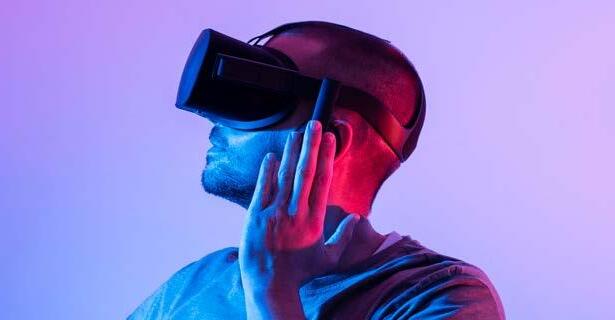
This Immersive Learning resource using Augmented Reality was created for the educational unit “Mathematics and data science for decision making”. Through this, students can navigate in a supermarket simulating the purchase of products. Once the purchase is made, the student must determine the number of calories they would consume, and how this information could impact their consumption habits, thanks to the analysis based on machine learning carried out.
Impact
6,230 students (August-December 2023)
Designer teachers
Germán Domínguez
Jesús Aguilar
Among the transversal skills developed by the students of the School of Engineering and Sciences, is “Digital Transformation” through the use of cutting-edge technologies and the formation of a digital culture. In this sense, in 2023 several projects were developed in Tec Virtual Campus, the educational metaverse of the Tecnológico de Monterrey. Some of the most notable projects are mentioned below.
The digital transformation in education has accelerated with new generations of digital native students. Online learning has become an essential part of the learning experience, especially in higher education. The use of the metaverse in an educational context is gaining more and more strength, since it allows the creation of 3D virtual spaces where students interact with others through avatars, overcoming the limitations of time, space and training in the educational process. In addition, it allows individual, asynchronous and selfdirected learning, making it a very attractive space for students.
Reimagining the teaching-learning process by implementing a virtual space for students to learn “Science, Technology and Engineering” (STE) has been a challenge for teachers. In this project, a virtual laboratory was designed and built within the Tec Virtual Campus metaverse to be implemented in some educational units of the Department of Industrial Engineering. This virtual space includes 2D and 360° videos of productive practices and processes, in addition to some webinars classified into four thematic areas, allowing the student self-directed, fun and more immersive learning.
To learn more about this educational experience, check out this video.
Impact
50 students of the Guadalajara Campus (February-June 2023)
Designer teachers
Abraham González Araceli Zavala Jonathan Cuevas


This block is an asynchronous online course, with the capacity to serve up to 150 students per group. It incorporates activities using the Tec Virtual Campus metaverse of the Tecnológico de Monterrey, as well as resources with Artificial Intelligence.
It uses ChatGPT to design a concept map of a logistics network, so that students learn how to use a forecasting method. The final presentations of the challenge took place at Tec Virtual Campus.
Impact
220 students and 120 teachers (AugustDecember 2023)
Design, coordination and implementation:
José A. Ramos
Rafael E. Bourguet
Víctor M. Rayas
Implementation:
Andreas Koch
Araceli Zavala
Gerardo Galaviz
Gerardo A. Silveyra
Jesús B. Rodríguez
José L. Ceciliano
Rodolfo Mendoza
Rodrigo Mercado
Sergio A. Medina
Educational innovation in the area of Health is transforming education through the integration of innovative teaching strategies, person-centered educational management, and the digitalization of different elements of the teaching-learning process. The latter has been characterized by the promotion of the use of mobile devices, the influence of telepresence in formats such as “telehealth” and the arrival of Artificial Intelligence.
At the School of Medicine and Health Sciences campuses, teachers actively
participate in initiatives with the fundamental objective of transforming the educational experience to accompany students on their journey of personal transformation at the university. This involves the way of organizing activities for educational purposes, using some educational tools, and evaluating the impact they have.
One of the main challenges is to maximize the use of all the resources that Tecnológico de Monterrey provides for the use of its educational community, for example, to have global classrooms where it is possible to connect people located in remote places, illustrate abstract concepts more effectively, or to demonstrate clinical cases considering the principles of patient safety and quality.
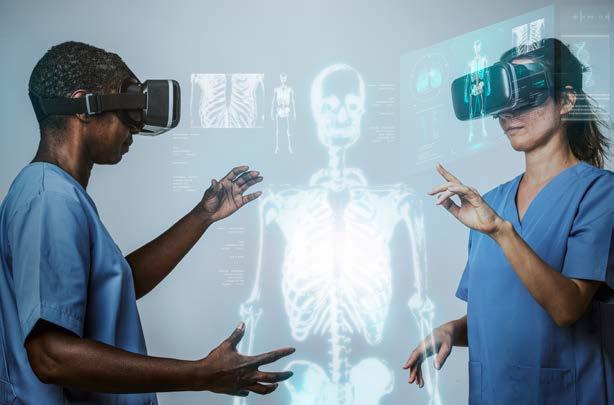
In 2023, the experience of the “Challenge-Based Learning” strategy translated into the implementation of innovative strategies for the School of Medicine and Health Sciences. Various emerging technologies were used, such as access to digital resources with content in various formats, access to digital laboratories, and use of augmented or mixed reality. One of the processes with the greatest impact was the documentation of the evaluation of knowledge and skills in a
systematized manner through enablers such as Learning Management Systems (LMS), which allow the application of online exams, the delivery of evidence from the students, the assessment of these using different instruments, as well as ensuring the development of competencies.
In all pilot projects and implementations, teacher participation was invaluable in achieving the desired results.
In this project, sixth semester students prepare their preclinical work scenario in a dental simulator in the following way: they put on the mixed reality glasses and begin to perform an endodontic procedure while following instructions from their virtual teacher, as well as obtaining additional information at each stage of the procedure.
One of the challenges that students face is that they have a total of two hours to carry out the process in a self-managed manner, which consists of more than 16 steps.
Impact
70 students and 30 teachers from the Monterrey Campus (January-June 2023)
Designer teachers
Carlos Presa
Karen Reyes
Regina García

at Tecnológico de Monterrey. 2023 Report

Through the AMBOSS portal, students of the Medical Surgeon career have access to educational resources in various digital formats. In this way, they can put together study plans according to their educational units, or use the resources to prepare for the closing stage exams or IFOM.
Licenses are assigned to students from the fourth semester until they complete their curriculum subjects.
700 students 100 teachers from the campuses: Mexico City, Guadalajara and Monterrey (February-June and August-December 2023)
In the School of Medicine and Health Sciences, the theoretical evaluation of knowledge is carried out centrally. The coordinators of educational units and teachers make a great effort in building banks of reagents and versions of evaluation instruments period by period. The psychometric analysis carried out is reported to each academy for their reflections and improvement processes.
Currently, the programs include: Medical Surgeon (MC), Bachelor of Biosciences (LBC), Medical and Dental Surgeon (MO) and Bachelor of Clinical and Health Psychology (LPS), and teachers from the Chihuahua, Mexico City campuses collaborate, Guadalajara, Monterrey and Querétaro.
Online evaluation through the Canvas platform is used semiannually in more than 8,500 online exams, corresponding to the undergraduate programs of the School of Medicine and Health Sciences.
2,100 students +150 teachers from the campuses: Mexico City, Chihuahua, Guadalajara, Monterrey and Querétaro (January-June and August-December 2023)
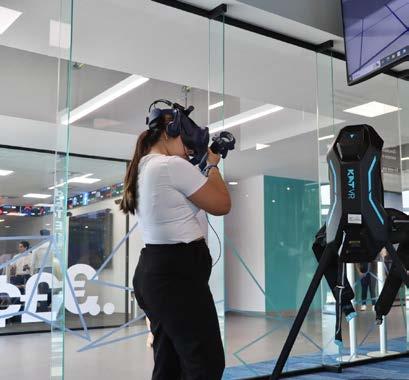
It is a challenge to precisely define what educational innovation entails, especially with regard to improving the teaching-learning process for students. The Institute for the Future of Education defines the term «educational innovation» as “the contemplation of various aspects: technology, didactics, pedagogy, processes and people; involves the implementation of a significant change in the teaching-learning process.” Furthermore, within that definition, it adds that “it must incorporate a change in materials and methods” (IFE, 2017).
For its part, the National Polytechnic Institute (IPN), states that “for educational innovation to occur, a relationship with the triad is required: teacher, students and content, and that to be considered Educational Innovation there must be an improvement in strategies. didactics, incorporation of technological tools and resources and teaching practice” (Educational Innovation, IPN, 2021).
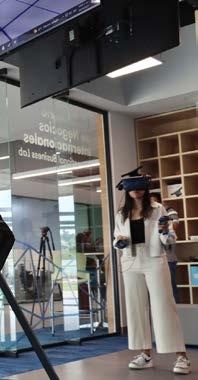
At the Business School, the educational innovation strategy focused on observing, evaluating and providing feedback on the transversal and disciplinary competencies selected from the eight programs in their intermediate evaluation and final evaluation stages. This in order to standardize efforts in the different programs, on all campuses, and collaborate between teachers, training partners, external evaluators, technology support and content creation.
Furthermore, the evaluation of competencies through a system allowed the Business School to make improvement efforts for the following generations, in order to strengthen the development of these competencies.
During 2023, the Business School successfully developed several projects and experiences directly related to educational innovation and digital education, thus offering added value to the educational experiences of the students. Some of these projects are described next.

Development of a simulator that facilitates timely feedback to students by a teacher. This is measured through a feedback survey applied to teachers.
There is a repository to record the progress of the development of skills in students, so that they can be seen in the assessment of the eighth semester.
Impact
1,500 students (February-June 2023)
Designer teachers
Claudia Ramírez
Edith Tirado
Luz del C. Díaz
Mariel Carreño
Martha E. Moreno
Verónica Baños
Final evaluation through the use of situational scenarios and interviews to observe the key performances associated with the professional competencies of eighth semester students, recognizing their graduation profile and focusing on the integration and synthesis of their learning. This was achieved through:
Ensuring the disciplinary and transversal graduation profile of the school’s academic programs through a formative evaluation by teachers and external evaluators.
Providing timely feedback to the student and documenting recommendations from internal and external evaluators for continuous program improvement.
Impact
3,000 students, 120 teachers and 240 external evaluators (February-June 2023)
Designer teachers
Jorge Ordoñez
Laura Zapata
Martha Moreno
Next are some of the strategic educational innovation and digital education projects developed by the EGADE Business School in 2023.
The national MBD meeting was held at the EGADE San Pedro, with an attendance of 63 students from the EGADE San Pedro and Santa Fe. Its objective was to generate a feeling of belonging to strengthen relationships between colleagues and promote networking through two innovative and memorable experiences carried out during the event.
The first experience took place during the breaks of the event, where the students formed teams and participated in a rally. The dynamic consisted of providing a series of clues to solve puzzles and identify objects with QR codes that displayed the challenge information through Augmented Reality. The second experience took place during networking; It consisted of the students facing various challenges with activities in a game format, for their integration.
Impact
63 students (February-June 2023)
Designer teacher
Abhishek Shashikant Nayak
During 2023, EGADE designed and implemented various academic experiences integrating the strategy of using video games.
This experience was offered in virtual mode as part of the activities of the “EGADE Action Week” event, where 23 students from EGADE San Pedro, Guadalajara, Santa Fe participated, through a national call, and online mode, integrated in 8 virtual teams.
A challenge was co-designed with Oxxo, based on three Sustainable Development Goals (SDGs). For two weeks, students from different academic programs generated solutions using the Design Thinking methodology, modeling prototypes in the Minecraft video game. This helped foster their creativity and generation of disruptive ideas, by presenting them in a format different from the everyday and traditional.
During Professor Jairo Orozco’s MBA class at EGADE San Pedro, 36 students integrated into a team developed an entrepreneurship proposal. To present the prototype they used the video game Minecraft as an innovative tool. The students had basic training and were provided with support manuals with the Design Thinking methodology, as well as the use of Minecraft.
Design of a recreational activity using the video game Overcooked in Professor Luciana Manfredi’s MBA class, at EGADE San Pedro. With the participation of 32 students, two teams were formed: players and evaluators. In different rounds, the team of players was observed by the team of evaluators to identify the level of skill management, such as: teamwork, communication and decision making. At the end, a group reflection was carried out to analyze the performance of the students.
23 students and 3 teachers from EGADE San Pedro, Campus Santa Fe and Campus Guadalajara
Designer teachers
Eduardo E. Aguiñaga
Eric Porras
Eva M. Guerra
Jairo A. Orozco
Luciana C. Manfredi
Ricardo V. Úbeda
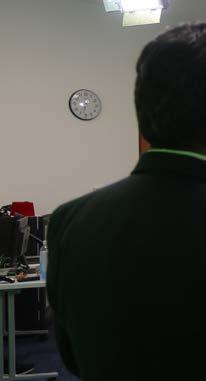
In July 2023, the Virtual Connection Room (VCR) was inaugurated, a new space at EGADE San Pedro that seeks to enhance the interaction and dynamics of teachers with students in a virtual format.
The room has advanced audiovisual technology to design experiences in real time, through six screens in which more than 50 students can be viewed in the same space. The teacher can control its presentation and interact with the students, as well as have automatic monitoring. This room designed by Educational Innovation of EGADE San Pedro, has a system for transmission with a production level of high demand.
Impact
100 students and 5 teachers (July-December 2023)
Participating teachers
Claudia M. Quintanilla
Federico Trigos
Horacio Arredondo
Jorge E. Velarde
René Cabral
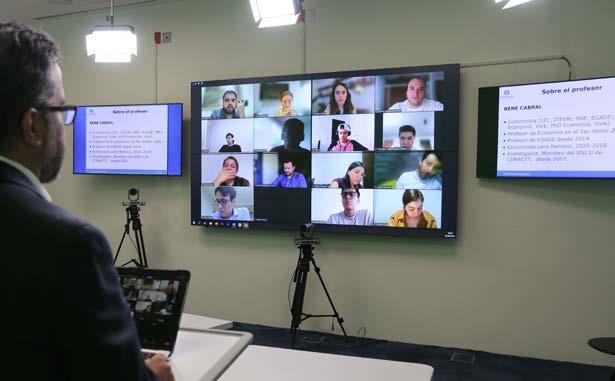

As part of the educational innovation strategy in High School, in 2023 the piloting of transdisciplinary projects focused on the concepts of Sustainability and Identity.
As an example of the above, the implementation of the teaching strategy of “Project-Based Learning” allowed our students and teachers to address a real and contextualized problem, drawing on different disciplines to understand all the dimensions of a problem, and thus in a Possible solution.
On the other hand, the “Algorithmic Biases” project focused on the uses of Artificial Intelligence from different perspectives of daily life, as well as the challenges it poses to develop algorithms that generate biases in decision making. This approach strategy
from different disciplinary areas allowed students to be made aware of different approaches from which the uses and biases involved in the use of AI can be understood. In addition, a multicampus class was piloted where students from 13 campuses participated virtually in the Tec Virtual Campus educational metaverse through the teaching of the “Communication and Art” class.
All of the previous learning experiences have proven to have a powerful impact on the experience and training of our students.

An interdisciplinary pilot project was designed and implemented with the themes of Peace and Wellbeing (second semester), and Sustainability (third semester). This project involved five subjects: Spanish, Social Sciences, Mathematics, Science and Technology. The project replaced the core activity to evaluate the development of disciplinary competencies.
Through this experience, the students developed training and disciplinary skills through an interdisciplinary project connected to a real problem, thus forming a bond within their school community and outside of it.
In the August-December 2022 semester, the topic of Sustainability was piloted on three campuses (Cuernavaca, State of Mexico and Eugenio Garza Sada), a single group per campus; In the January-May 2023 semester, the topic Peace and Wellbeing was presented on the same three campuses, but with all their second semester groups; and finally, the topic of Sustainability was presented on seven campuses (Cuernavaca, Cumbres, State of Mexico, Eugenio Garza Sada, Guadalajara, Irapuato, Valle Alto), in the August-December 2023 semester.
The Sustainability project asked the students to solve the following challenge: How can you reduce your ecological footprint and that of your community by 10%? For its part, the Peace and Wellbeing project had the following challenge: How can you be an agent of construction of Peace and Wellbeing in your community and beyond? Through inquiry, prototype design, peer and expert feedback, the students presented to their community a specific problem they chose, as well as their proposed solution.
This project had the intention of developing learning and skills such as critical thinking, collaboration and personal and social responsibility, through the “Project Based Learning” technique, but in an inter and transdisciplinary way to address a real problem and complex, as are climate change and peace. To learn more about the Peace and Wellbeing project, you can consult this publication.
1,200 students and 180 teachers from the campuses: Cuernavaca, Cumbres, State of México, Eugenio Garza Sada, Guadalajara, Irapuato and Valle Alto

A pilot interdisciplinary project with the theme of Identity was designed and implemented (first semester). This project involved six subjects: Spanish, Social Sciences, Mathematics, Science, Mentoring and Technology. The project replaced the core activity to evaluate the development of disciplinary competencies. In the August-December 2023 semester, it was piloted on five campuses (Mexico City, Eugenio Garza Lagüera, Puebla, Sonora Norte, Santa Catarina), with only one group per campus.
The Identity project aims to provoke an exploration of the concept from 5 different spheres: biological, historical, digital, personal and cultural identity. Through various guiding activities, students learn about issues from their past and reflect on their present and, with that information, create an artistic work in which they express their findings about their identity.
140 students and 36 teachers from the campuses: Mexico City, Eugenio Garza Lagüera, Puebla, Santa Catarina and Sonora Norte (August-December 2023)
Students from 13 high schools of the Tecnológico de Monterrey took the “Communication and art” class of the Spanish subject, through the Tec Virtual Campus platform and another metaverse, involving innovative tools and an avant-garde environment to carry out their activities.
Impact
26 students from the campuses: Mexico City (headquarters), Obregón City, Chiapas, Cumbres, Esmeralda, State of México, Eugenio Garza Lagüera, Hidalgo, Saltillo, Santa Catarina, Santa Fe, Sinaloa and Valle Alto (AugustDecember 2023)
Participating teachers
Artemisa Sangermán
Within the framework of the “International Day of Access to Information”, PrepaTec teachers and students had the opportunity to learn basic concepts of Artificial Intelligence (AI) and algorithmic biases, to reflect on the impact that AI already has on their lives, and the way in which the future is changing from different disciplines.
Starting from the topic of algorithmic biases, case studies were designed from each of the PrepaTec academies. The cases addressed the biases that Artificial Intelligence could present if it were allowed to make decisions about Health, Public Policies, Urban Planning, Education, Literature and Economy. The students answered reflection questions about the previous biases, discussed them in class, and finally shared their experiences.
The students learned the basic terms of AI and the way it analyzes data and makes decisions. They played with the Most Likely Machine digital resource in one of their subjects, and thus understood the problem of algorithmic biases and the influence of people on the decisions made by AI.
Impact
+180 teachers (AugustDecember 2023)
Educational innovation and digital education in the Vice-Rector’s Office for Continuing Education

4 Projects
4 Teachers
272 Students-course
During 2023, the ViceRector for Continuing Education focused its educational innovation efforts on the consolidation of “The Learning Gate” training program.
This project was launched on the market in 2022 as a minimum viable product with flexible learning paths in the areas of leadership and data science. In 2023 it offered new learning routes and modalities, new functionalities for experience, as well as a didactic strategy for knowledge transfer.
Likewise, another of its innovative strategies was the use of generative Artificial Intelligence in the design of a training program to develop new skills in continuing education facilitators.
As part of the educational innovation actions implemented during 2023 in the “The Learning Gate” program, the following 8 new flexible learning routes were designed and produced, in the areas of Marketing, Sales, Finance, Project Management and Operational Excellence:
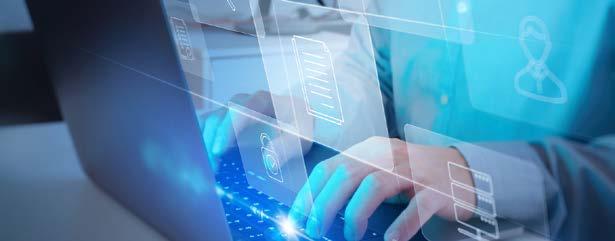
As shown in the table above, this program offers 278 products between learning routes, competencies and sub-competencies. While some of the new routes have only recently been launched, more than 700 students have already signed up. Likewise, the production of 3 more routes began in the areas of Project Management and Operational Excellence, and 5 more in Digital Transformation.
Likewise, with the purpose of adapting to the preferences and learning styles of the participants, the following two new modalities were introduced to help improve the completion rate:
For those who prefer to learn in community:
Join a generation.
Move forward together with the same order and rhythm.
Receive live coaching sessions with the teacher in each module.
On the other hand, new functionalities are incorporated into the ecosystem to improve the user experience through:
A more intuitive interface for the participant.
Improvements to the navigation of the teacher evaluating the challenges to ensure that the evaluation and feedback process is developed in an agile and timely manner.
Tools for easy and timely monitoring of the progress of each participant to facilitate the support of the success partner at key moments, and thus ensure the successful completion of the training process.
“Recent Activity” section to facilitate access and consultation to recently reviewed resources.
Finally, the design of an “Autonomous Domain Integrating Project (ADIP)” was incorporated to ensure valuable results at the conclusion of the learning routes, which is essential for the significance of a continuing education program. The PIDA allows the participant to develop and accredit the autonomous capacity to give results by applying what they have learned in their daily life.
those who prefer maximum
Customize your route according to your interests and priorities.
You decide when and at what pace. Your success partner accompanies you to ensure your own success.
At the end of the training route, the participant:
Defines a specific improvement objective, a success indicator, and a goal.
Autonomously proposes a work plan (2 to 3 months) to achieve it based on what has been learned.
Executes the work plan.
Generates valuable results.
For their part, the teacher:
Validates and approves the work plan.
Provides follow-up and intermediate coaching.
Evaluates the development and final result of the project, and provides feedback.
Accredits the autonomous capacity of the participant to provide results.
The ADIP is incorporated into “The Learning Gate”, LiFE programs and some Virtual Classroom programs to ensure the generation of valuable results.
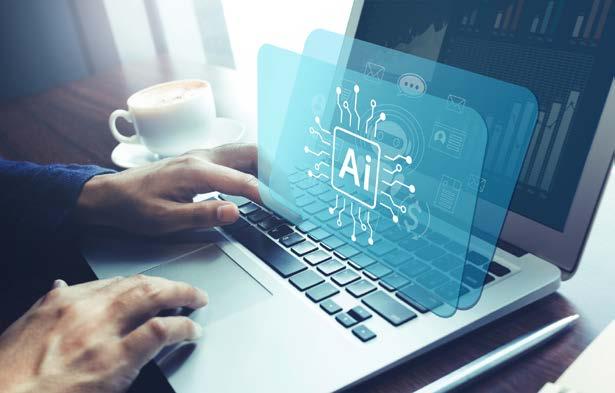
During August and September 2023, a new training program was integrated to capitalize on generative Artificial Intelligence to support teachers in the different functions they perform in a continuing education program.
This initiative was developed as a pilot plan for a group of 12 continuing education teachers, who will
support the process of replicating it to the entire community of continuing education teachers on the following topics:
Trend research
Thematic content development
Image development
Production of learning resources (videos, podcasts, etc.)


Artificial intelligence (AI) is a field of computing focused on creating systems and programs capable of performing tasks that normally require human intelligence. These systems are designed to learn, reason, make decisions, solve problems and recognize patterns in a similar way to what a human mind would do, although using algorithms and computer processes.
AI covers a wide range of applications, from voice and image recognition programs, to recommendation systems, autonomous driving, natural language processing, medical diagnosis and much more. It uses techniques such as machine learning, neural networks, fuzzy logic and data processing to simulate human intelligence at different levels and contexts.
Generative Artificial Intelligence refers to a subfield of AI focused on the creation of systems capable of generating original and novel content, such as images, text, music or even videos, that have characteristics and structures similar to those created by humans.
These systems use generative models, such as generative neural networks (GANs) or language models, to produce new content from existing data sets. It can be applied in various fields. In the educational field, it can be used for different academic purposes to offer tools and resources that complement the work of teachers, while enriching the experience of students.
Some examples are:
Creation of content, activities and evaluations to make the design process more efficient.
Virtual assistants to support teaching.
Personalization of instruction, which allows feedback to be provided in real time, as well as making it easier for teachers to prepare teaching content or evaluate academic performance.
Simulations and learning environments to provide enriched educational experiences with the use of immersive technologies.
Generation of educational materials accessible to a broader audience, including people with disabilities.
Administrative efficiency for the automation of routine tasks and application of predictive analysis for resource management.

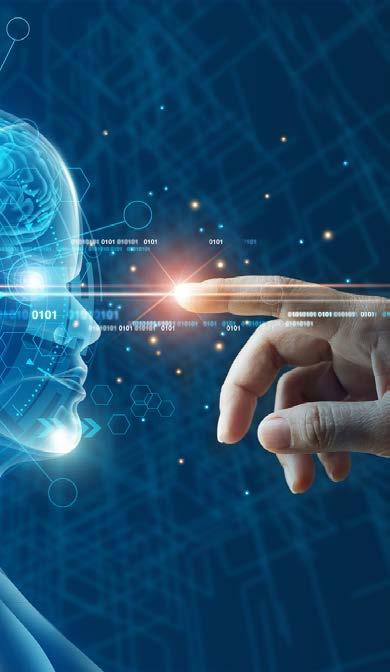
The rise of Artificial Intelligence technologies, and in particular generative intelligence, has been a watershed in the development of new applications that use these technologies. Considering the relevance of this issue in the educational sector, Tecnológico de Monterrey launched several initiatives described next.
It is an ecosystem of tools around generative AI to create specific purpose models that can be consumed directly, or exposed in other enablers, all under a private, secure, managed and customizable environment, for exclusive use of the Tec community.
We are sure that the creation of components with GPT technology and Generative Artificial Intelligence will be the key to the development of smarter technological enablers that are adaptable to the needs of users in the institution’s academic community.
Privacy
Security
Flexibility
Connectivity
Provides mechanisms to: Generate educational content
Improve virtual assistance and attention
Promote automatic feedback
Encourage personalization of learning Implement idea enhancers Stimulate innovation

In September 2023, the Vice Presidency of Digital Transformation launched the TECgpt Portal for the academic community of Tecnológico de Monterrey. This is a platform developed to make available to the Tec community different specific purpose models based on generative AI functionalities, using GPT technology in a simple, customizable and secure way, being the first university in Mexico and Latin America to apply it privately.
Project in piloting phase with the objective of creating an intelligent academic virtual assistant that functions as a support tool in the learning process for students with areas of opportunity in the disciplinary concepts of Physics, in the educational units “Modeling of movement in engineering” and “Principles of conservation in engineering”, at the Professional level.
Among its features is the use of GPT technology and the integration of curated content to ensure quality in the assistant’s responses.
With the support of 3 teachers, and through a content curation process, 119 disciplinary concepts grouped into 15 different topics will soon be integrated, which are part of the academic aspects most requested by students in these educational units.
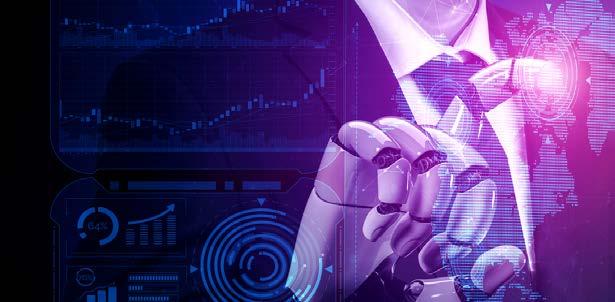
Project in development phase to identify the cognitive-affective state of students during class, through face analysis with the help of Artificial Intelligence, and generate proposals for teaching strategies so that teachers guide the group towards an optimal state for learning.
The project seeks to develop:
Real-time dashboard of the group’s cognitiveaffective states, with didactic recommendations to increase predisposition to learning.
Pedagogical model for applying this innovation in the different learning modalities of the institution, considering at least one live use model and one prospective one.
Integrative report of the cognitive-affective response of the students to the teaching intervention, as an input to optimize the didactic strategy in the educational units.

In the first phase of this project, the parameters for identifying cognitive-affective states will be determined during the various moments of class, measuring factors such as emotional states, attention and physiological activation in some groups of in-person and digital modalities.
Once the analysis parameters are adjusted to the population of Tec de Monterrey students, the implementation of the technology in various
learning modalities will be piloted, with the intention of analyzing the potential of its adoption by the teachers of the institution. Although one of the main goals of the project is to provide the teacher with a tool to make teaching decisions based on concrete data, it is also expected that the information obtained by the software will generate relevant data for the analysis of teaching processes in the classroom.
The implementation of the Adaptive Learning strategy has continued in coordination with the School of Engineering and Sciences. An Artificial Intelligence engine is used that allows each student to have a personalized route, since special content is presented when they need it. In turn, teachers have the opportunity to consult the learning analytics before going to class to be able to adapt their teaching according to the needs of the group.

In order to identify the patterns and differences between the courses and sub-competencies, as well as the progress of the cohorts in meeting the established objectives, in 2023 various studies and analyzes of the educational units of the 2019 plans were carried out (Tec21 Model ), using statistical techniques considering data from 4 years and more than 900 first generation students from different Schools and Programs.
In the first phase, the following analyzes were carried out:
Relationships between block and subject variables, such as the final grade and the level of subcompetences, among others.
Grouping of educational units according to common sub-competencies throughout a program, through a hierarchical clustering analysis.
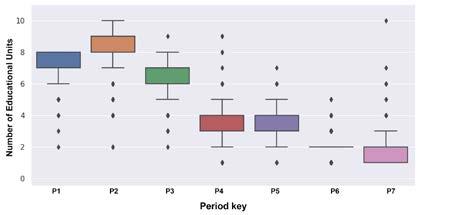

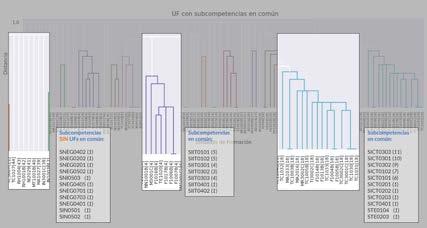
Cluster analysis of sub-competencies by educational unit, throughout a program
These analyzes generated more than 50 views. In a next phase, the impact and results of the Tec21 Model plan will be analyzed, together with the Academic Vice-Rector’s Office and functional experts, to support decision-making in the continuous improvement of study plans. This phase will be a bridge to predictive analysis, where areas of improvement and recommendations will be sought to optimize the performance of students and teachers.
The use of automation tools for evaluation and feedback, supported by Artificial Intelligence, aims to reduce the time dedicated by teachers to evaluation without compromising quality, allowing them to dedicate that time to other essential activities in the educational process. Simultaneously, students experience an improved perception of their classes by receiving feedback more quickly. This agility in feedback not only contributes to a dynamic learning environment, but also enables students to address and correct their errors in a timely manner, thus fostering a continuous cycle of improvement in their academic performance.
In terms of the pilot project, it seeks to optimize the evaluation of academic activities, especially in STEM disciplines. By allowing the simultaneous grading of specific questions across all activities, the initiative aims to accelerate the identification and classification of items, which will contribute to more efficient and uniform evaluation.
The execution of the pilot will be carried out during the winter period of 2024, as well as in the period from February to June 2024, through an initiative in conjunction with different areas of the Tec. It is expected to provide a solid understanding of the feasibility and the potential benefits of this initiative, paving the way for future larger scale implementations in the educational field.
Currently, the application of generative Artificial Intelligence tools is being contemplated: ChatGPT and Dall-e, from OPEN AI.
A pilot was carried out in the February-June 2023 semester, in online digital modalities educational units, ELITE and FIT, to evaluate the impact of Artificial Intelligence as a support resource in the teachinglearning process.
Teachers from different disciplines incorporated AI into learning activities with an ethical approach. The pilot received pedagogical support with a support plan for teachers, involving the areas of Pedagogical Design and Architecture, Digital Education, and with support from the Academic Integrity Program. This intentional experimentation with AI strategies allowed us to establish recommendations, based on findings, about the correct and ethical use of these tools for their future implementation in education.
The following participated:
20 Groups
6 National Schools
28 Teachers
3,338 Students
24 Campus
Learning enriched with Artificial Intelligence
consider it useful believes that it allows the activity to be carried out with greater speed expresses that it contributes to creating one's own interpretation of the concepts that were addressed in the activity
“I liked that tools like these are integrated into the academic program instead of prohibiting them, since their existence is inevitable and I think it is better to learn to use them responsibly.”
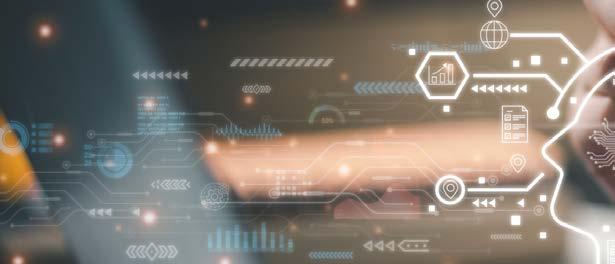
AI plays an increasingly important role in higher education, improving the quality of teaching, personalizing learning, facilitating educational management and opening new possibilities for research and access to education to a broader spectrum of people. For this reason, all the National Schools of the institution have implemented the application of technological tools based on Artificial Intelligence in their educational units. Below is the total number of projects deployed in each of them during 2023.
Educational innovation projects with AI-based technologies in Schools
For more details on these projects, consult topic 6 of this report: Innovative and digital educational experiences in the institution.
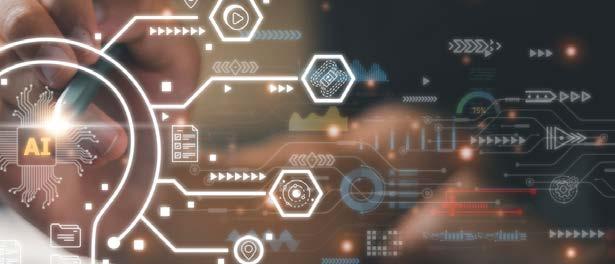
Current status of academic offerings and areas focused on or related to Artificial Intelligence at Tecnológico de Monterrey
Undergraduate*
Data Science and Mathematics Engineering
Robotics and Digital Systems Engineering
Graduate Areas
Master in Applied Artificial Intelligence
Specialty in Applied Artificial Intelligence
Master in Cybersecurity
PhD in Computer Science
Artificial Intelligence Hub
Data Science Hub
Advanced Artificial Intelligence Research Group
*In some cases, the entire program is not focused on AI, only some courses.
In addition to the above, the professional careers are:
Data Science and Mathematics Engineering
Robotics and Digital Systems Engineering
Bachelor’s Degree in Digital Art
Initiatives and drivers of innovative digital educational experiences
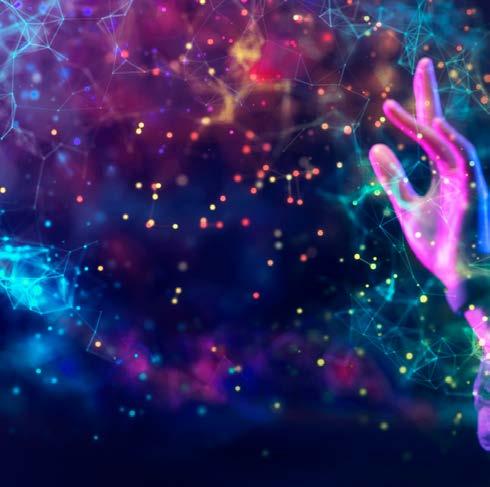
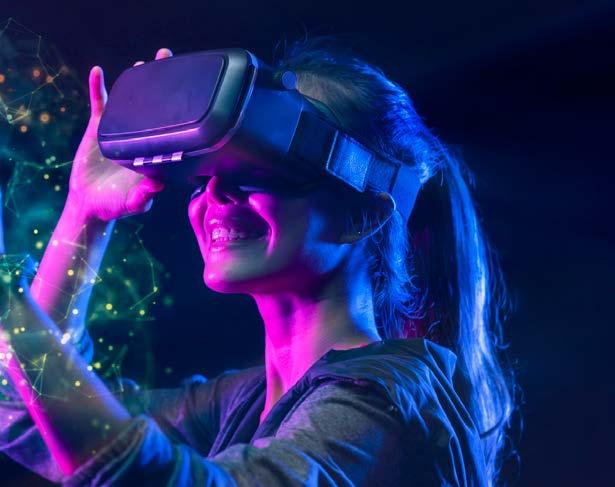
It is an educational strategy that uses technology based on data analytics to adapt education and create a personalized learning route whose contents were previously designed by the teacher, so that it is effective and efficient for each student, based on their level of knowledge. performance, their profile and their learning needs. This allows the teacher to identify gaps in the group’s understanding to establish improvement actions and adjust their educational practice, thus optimizing the performance of their students. With the proper application of this strategy, it contributes to achieving academic success in key educational units for students who begin their journey in the Tec21 Model.
The Vice-Rector for Educational Innovation and Academic Regulations designed a pilot for 4 educational units of the School of Engineering and Sciences in the areas of Mathematics, Physics and Computing. In conjunction with the Academic Vice-Rector’s Office, the strategy for incorporating a leveling topic in the pilot educational units was defined, where students who require it can practice the topics of prior knowledge through personalized routes, which allows the group to level their base knowledge, thus allowing the teacher to focus on the new content.
Students and teachers from 13 campuses participated in the pilot: Aguascalientes, Mexico City, Juárez City, Obregón City, Chihuahua, State of Mexico, Laguna, León, Monterrey, Puebla, Querétaro, Sinaloa and Tampico, as well as Digital Education students, for a total of 1,102 students and 58 teachers in 4 educational units. Additionally, the pilot had the support of the Institute for the Future of Education, with the objective of conducting research that measures the level of improvement in student learning by applying this educational strategy; Subsequently, the research results will serve for continuous improvement.
In 2023, other courses were taught where the Personalized Learning strategy with adaptive bases was applied, through CANVAS as a technological platform, in which learning routes were designed emulating an adaptive platform. A total of 797 students and 23 teachers participated in 2 educational units.
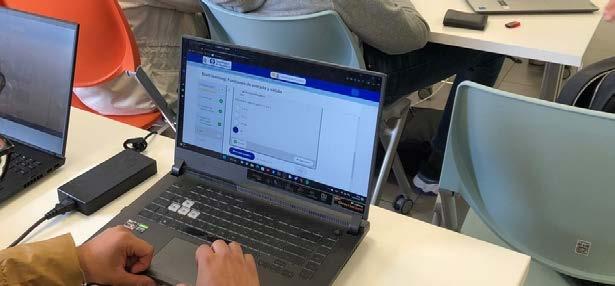
Impact:
33,677 Students
936 Teachers
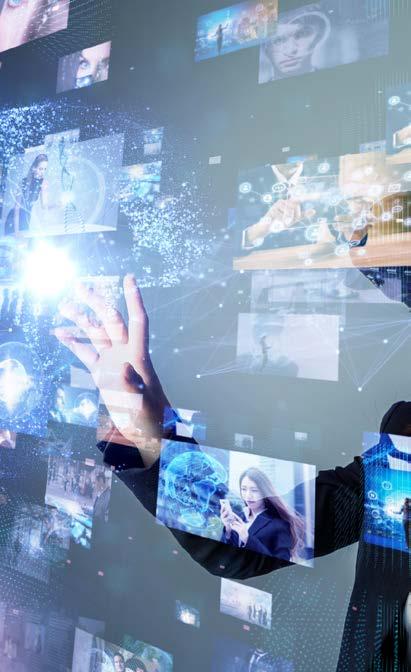

Innovation Strategy where the learning experience happens in Extended Reality environments such as Virtual Reality, Augmented Reality and Mixed Reality, supporting the teaching-learning process to develop and evaluate knowledge, skills and competencies in an experiential, active and immersive way.
Students from the Dental Surgeon program at the School of Medicine and Health Sciences carried out a practice in March 2023 using the Mixed Reality resource. This exploratory pilot complemented a final evaluation of the preclinical practice of the Endodontics area. With a HoloLens device, the doctor obtains an immediate visualization of the patient’s information, superimposed on the patient’s reality directly with a vision of the clinical scenario; Likewise, the medical student can obtain a better understanding of complex anatomies or procedures, allowing him/her to execute therapeutic tasks with improved and immersive guidance.
18 students from the School of Medicine and Health Sciences
Designer teachers
José C. Presa
Karen L. Reyes
This path is within the Lean Six Sigma Green Belt Certification. Its main purpose is to familiarize participants with the tools used in this phase and their expected results. In this collaborative environment, they were able to work together with their teacher and the rest of the group, sharing learning, ideas and answering questions interactively. Through an immersive and collaborative approach, the students were able to apply the tools learned and advance in the continuous improvement of their Six Sigma projects.
Impact
350 students of the School of Engineering and Sciences
Designer teachers
Froylán Franco
Ivonne Abud
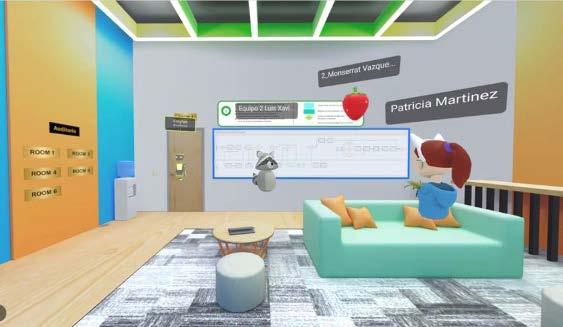
Heineken digital factory: Use of extended reality as an engagement strategy to link content and skills
This learning experience with Extended Realities from the School of Engineering and Sciences was launched for the first time nationwide in January 2023. This resource allows you to view the digital factory of the Heineken Brewery, showing the scenarios to view them in a 360 environment. as well as knowing the production lines in which an Industrial Engineer carries out activities specific to their area.
Impact
1,749 students of the School of Engineering and Sciences
Designer teachers
Ana M. Turcios
Fabiola Lima
Luis A. Ramírez
María I. Ruiz
Ricardo Ipiña
Vianney Lara
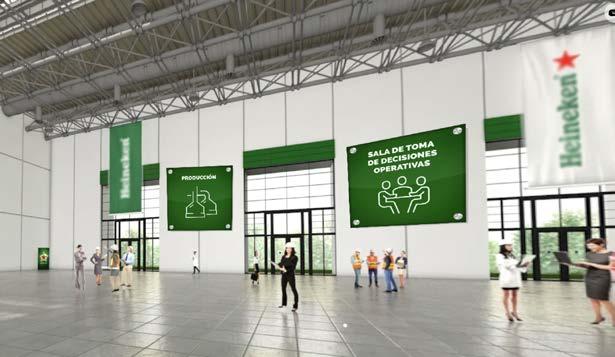
Impact
100 Continuing Education students
Designer teacher Francisco S. García
For the Seminar on innovation in the construction of Continuing Education, 2 experiences with Mixed Reality were developed that are described below.
Educational challenge focused on the construction industry, which uses Mixed Reality technology to address problems related to the optimization and leveling of concrete components. In this innovative way, the student designs a solid technical solution supported by justifications thanks to immersive practice, presenting it in a sketch. The activity encourages creative thinking and problem solving in the context of construction.
Participants immerse themselves in an educational challenge focused on occupational risk management in construction using Extended Reality technology. In this way, participants can prioritize the identified risks and discuss the importance of prevention, situational awareness, teamwork and regulatory compliance.
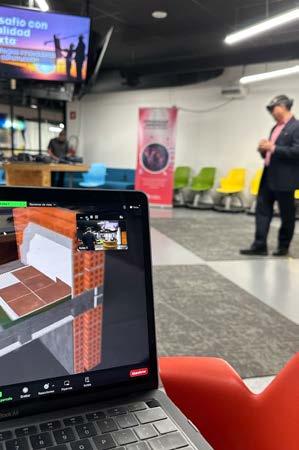


Virtual Reality Space, teaching-learning space: Escape Room “Future Exploration”, strategic business prospective, strategic thinking
The “Future Exploration” Escape Room seeks to become a new form of teaching-learning of the concepts, principles, currents, methodologies and tools of strategic foresight, through the design of a virtual collaborative learning space based on the solution of conceptual challenges. , where the student reinforces content through active learning. The integral experience is conceptualized as a space trip that consists of three moments: takeoff, stay at the space station and landing. The space station is made up of four themed rooms, where each one constitutes its own Escape Room with particular challenges.
Impact
711 students of the School of Government and Social Sciences
Designer teachers:
Guillermo Gándara
Pamela Rodríguez
To know the published articles referring to this topic, please consult Appendix 1: Publications on educational innovation..
Immersion in the metaverse to create stories, “Audiovisual narrative”
As avatars that tell their story in the “Audiovisual Narrative” educational unit, the students enter the metaverse and in 30 minutes they bring the avatars to life, assign them a name and develop stories based on their characters. This activity develops creativity and storytelling skills.
Impact
25 students of the School of Humanities and Education
Designer teachers
Manuel H. Ayala
O. Nathaly Garza
In addition to the granting of professional titles, certificates, diplomas and academic degrees, Tecnológico de Monterrey considers two types of credentials in its educational model and offering: Curricular Credentials and Alternative Credentials. According to previously established design and operation guidelines, they are awarded to Undergraduate, Graduate and Continuing Education students.
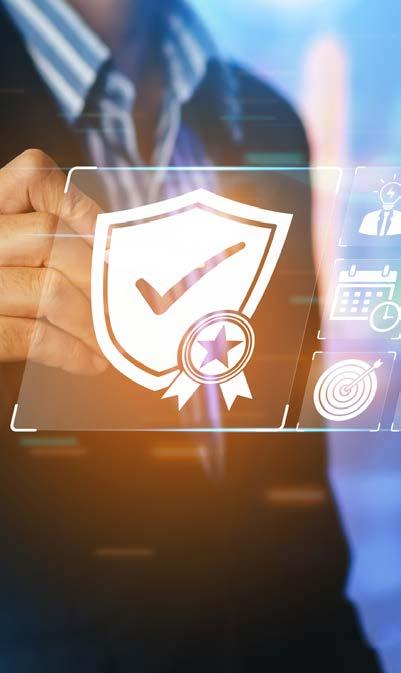

The Tec21 Educational Model for Undergraduate allows the formation of solid and comprehensive skills that help its students to solve, in a creative and strategic way, the challenges of the present and the future. One of the institution’s commitments is to recognize and make evident the comprehensive development and achievement of the competencies associated with the graduation profiles of its students. To make this possible, the institution defined the guidelines for the issuance of Curricular Credentials, as well as the design premises of Alternative Professional Credentials for their offer in the medium term, thus managing to offer its students the opportunity to enrich their professional profile. which in turn will allow them to accelerate their insertion into the labor market.
Through the Center for Evaluation and Alternative Credentials (CECA), a service area belonging to the Academic Vice-Rector of the institution, the management and deployment strategy of these credentials was defined.
To achieve the above, a work plan was carried out with all the areas involved in communicating and enabling the issuance of credentials. With the objective of managing the achievements of students’ skills, the “Institutional Achievement Manager” was developed internally.
Through this enabler, the mapping of all the competencies declared in the graduation profile of each of the study plans was carried out. According to the record of the sub-competencies achieved by the students, the “Institutional Achievement Manager” identifies the curricular competencies that a student acquired according to the requirements previously defined in the tool, thus managing to program the issuance of the acquired Curriculum Credentials.
Each Curricular Credential of disciplinary competence is represented in cyberspace by means of a digital badge that can be shared through different digital media, such as LinkedIn, Facebook, among others. To safeguard the validity and authenticity of the credential and its insignia, high security technology is used for its issuance. To track the issuance and publication of credentials, special boards were enabled where the total number of credentials granted, issued and published on different social networks can be identified.
The first two 2023 generations of the Tec21 Model, a competency-based educational model, were
made up of 8,158 graduates, who were notified of a total of 44,715 achievements; of these, 15,899 already have the digital badge issued by the new professional.
The activation of the monitoring boards allows defining communication and support strategies for new graduates, now members of the EXATEC community, about the value contribution of these credentials, and how they provide them with a unique profile that will undoubtedly support them to accelerate their process of entering the labor market.
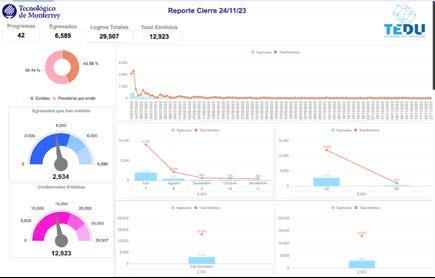
Example of the monitoring board for the issuance of Curricular Credential badges for disciplinary competencies
Example of the dashboard tracking social media platforms through which badges are shared

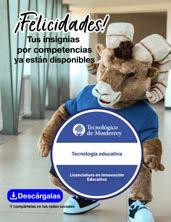
Example of dissemination and delivery of badges
Alternative Credentials recognize specific learning achievements, skills and competencies obtained through training experiences independent of the formal Professional titles and academic degrees from Tecnológico de Monterrey. During 2023, this strategy has been deployed at different academic levels and areas of the institution through various projects, such as those presented below.
In Undergraduate, in addition to the issuance of the first Curricular Credentials, the Alternative Credentials strategy was deployed through an offer of Digital Continuing Education Seminars. Through these, students who were candidates for graduation could credit one or two Tec Weeks, according to
their needs to meet the graduation requirement. At the end of the year, 102 students obtained their Alternative Credentials, 79 of them took 1 seminar, and 22 students took 2 seminars and one of them took 3 seminars, thus achieving a total of 126 accreditations.
In Postgraduate studies, the offer of programs such as Certificates and Flexpaths that are part of a catalog of Alternative Credentials increased. This allows students to have more opportunities to obtain credits that can be credited as subjects in a Graduate program. The possibility is also opened for international students to access them. To facilitate this accreditation process for Postgraduate students, a special app was enabled on the miTec institutional portal.

In Continuing Education, 1,481 programs were taught in the Virtual Classroom and LIVE modalities, to 39,337 participants. Together with all modalities, in The Learning Gate and language programs, 124,265 digital badges were awarded.
In addition, the new Alternative Credentials model was designed that begins in January 2024. The programs will be segmented into two categories: optional mastery programs and programs with evidence of mastery. The latter will grant Alternative Credentials called “Certificates” and “Certifications”. Certificates will be awarded for having demonstrated evidence of mastery of key knowledge and competencies, as described in the table below.
Participants who, in addition to having demonstrated the competencies associated with a certificate, develop an integrative project and generate satisfactory results in their environment based on learning, will be granted another type of Alternative Credential: Certification.
Given the quality standards of the evaluation process, some of the Alternative Continuing Education Credentials that meet certain preestablished guidelines may accredit Graduate subjects.
With these new Alternative Credentials, the employability of the participants is supported and better responds to the need of recruiters to reliably assess the competencies of the candidates and their transformative potential in the organization.
Through the Institute for the Future of Education, and in conjunction with the Directorate of Educational Innovation and Digital Learning, the MOOC “Alternative Credentials: the future of certifications” was created, which is designed mainly for teachers and educational personnel in university and/or business environments, who have an interest in identifying and applying training and skills credentialing. This course offers an introduction to Alternative Credentials and their application in universities through the Coursera and EdX platforms.
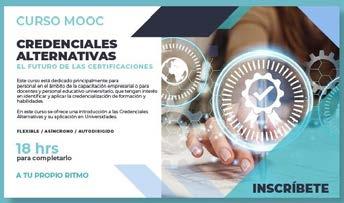
The Vice-Rector’s Office for Educational Innovation and Academic Regulations, with the support of the Undergraduate, Graduate and Continuing Education areas, published the document “Alternative Credentials at Tecnológico de Monterrey”, which highlights its importance as a new form of demonstration of knowledge, skills and competencies, also sharing the institutional framework defined by the Academic Vice-Rector’s Office through the Center for Evaluation and Alternative Credentials with the collaboration of the different Schools and Vice-Rector’s Offices. For more information, download the document through the following means:


http://bit.ly/CredencialesAlternativas

version https://bit.ly/AlternativeCredentials-Tec
The purpose of the Center for Teaching Development and Educational Innovation (CEDDIE) is to promote and facilitate educational innovation generated by teachers, through its model of development and recognition of teaching, intellectual vitality and service. With the aim of inspiring teachers to innovate in their educational practice, this center has a solid educational innovation process.
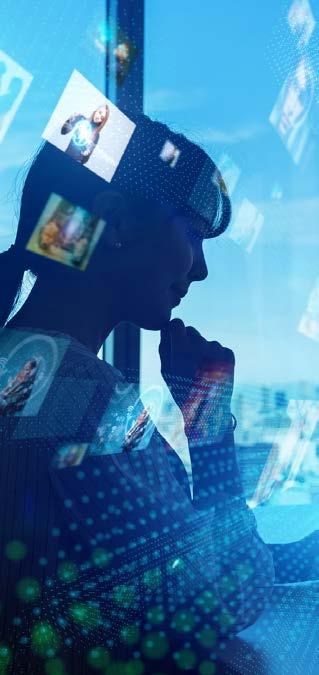

To innovate in education, teachers promote improvements in teaching and learning from their experience in the classroom, through an ecosystem that encourages the generation of ideas, collaboration and dissemination.
The year 2023 has been special due to the rise of generative Artificial Intelligence (AI), as it has provided new opportunities to experiment in search of alternatives to address challenges in education. To facilitate the design and
incorporation of educational strategies based on Artificial Intelligence, activities were carried out with the following purposes:
Make known its potential and scope.
Use tools to impact teaching and learning.
Use tools to guide the implementation of AI for the design of learning and teaching experiences.
To facilitate the incorporation of Artificial Intelligence in teaching practice, different strategies were carried out, among which the following stand out:
As part of the strategy of using Artificial Intelligence to teach and learn, talks were held with expert teachers and pioneers on the subject, on various perspectives; Through these, 2,090 teachers were impacted. In these dialogue spaces, teachers and experts had the opportunity to interact both to increase knowledge of AI and to explore its uses in the educational field.
As part of the dissemination of this relevant topic, two episodes have been published on the Sintonía CEDDIE podcast, listened to date by +450 people.
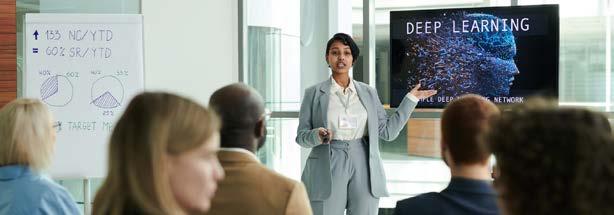
The National Teachers’ Meeting (RNP) 2023 was an opportunity to offer workshops on the use of AI. The course offering on Artificial Intelligence in education included 7 workshops (eleven sessions in total), attended by 2,074 teachers. Likewise, during the summer a Discipline Update Course (CADi) was offered on “Use of Artificial Intelligence in Teaching Practice”.
The objective of the practical activity of the Bootcamp was to learn strategies to incorporate Artificial Intelligence to improve teaching and learning, with the aim of leading participants to the design and implementation of their own strategies in their courses.
3 editions were offered in which +130 teachers participated. The experience was led by educational innovation leaders at CEDDIE.
During the summer, the CADi “Use of Artificial Intelligence in Teaching Practice” was taught, in which around 50 teachers learned about strategies for using Artificial Intelligence in their teaching practice, also carrying out rapid implementations.
Implementation pilots of AI tools and strategies are carried out to generate learning of best practices; 8 teams of teachers participated with support.
During the second semester of the year, the “AI Pioneer” badge was awarded to teachers who implemented Artificial Intelligence implementations in their teaching practice. To date, +150 teachers have been recognized.
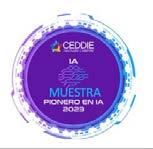
Badge sample 2023
To teach how to use new innovative educational tools and strategies, there is a continuous offer of workshops, in addition to disseminating innovative practices carried out by teachers, which can be adopted by interested colleagues. During the year, +260 activities were carried out that managed to impact +4,200 teachers. 2 of the talks were given by international experts.
For the second time, the space was enabled to share, celebrate and recognize the experiences and educational innovation projects carried out by our teachers.
Teachers from Tecnológico de Monterrey were invited to participate in the Festival “Learning from our educational innovation experiences.” This year, the call aimed to identify innovative projects and implementations in the following thematic lines:
A. Pedagogical transformation. The project or initiative refers to the application of new methodologies to promote a change in the teachinglearning process, such as the deployment of new didactic practices, learning strategies and means of delivery.
B. Technologies for education. It refers to the incorporation and/or implementation of technologies applied to the transformation and improvement of educational experiences.
C. Management of the student’s experience. The project or initiative implements processes for the student experience and proposes efficiencies in the design, operation or administration of educational experiences, such as the link with training partners.
Projects that stood out in any of the following criteria were recognized:
They impact the transformation of the teachinglearning process.
They transcend and have the potential to detonate and undertake new projects.
They explore new technologies, pedagogies or emerging educational strategies.
They multiply, involving other actors in the development of ideas.
The virtual exhibition featured 95 projects carried out by 183 teachers. 10 projects that stood out in some of the categories considered were recognized, and two projects that stood out in all of them.

III. New educational innovation platform
The new educational innovation platform was released that offers teachers a space that integrates documentation initiatives (Registry i), obtaining funds (NOVUS) and evaluation of educational innovation (Scale i).
The documented calls that were followed up in this space were:
NOVUS 2023 Call
Hackathon 2023
Festival “Learning from our educational innovation experiences”
Monitoring evidence of educational innovation for the classification process
The evaluation process of the innovative practices that teachers register gives a high chance that the
proposals will be accepted in various calls, including NOVUS and the teaching classification process.
This year, 808 experiences and projects were documented on the platform; 261 corresponding to the NOVUS call and 547 for the calls for recognition of educational innovation.
Access to the platform is found in MiTec and is identified as “my educational innovation”. Upon entering, the platform recognizes the teacher’s academic profile.

In the month of January, the first national hackathon was held to generate innovative solution alternatives, according to the educational challenge of recapturing the attention of students in a creative and meaningful way, in a post-pandemic world. For two days, the participating teachers devised solutions, received advice through interaction with experts and workshops on new trends, with the support of 7 speakers. At the end of the event, the solutions were presented in pitch format, choosing the most viable and innovative ones with the aim of granting them special recognition and support for their implementation.
The categories of the proposals were the following:
Pedagogies or emerging technologies
Emotions in the educational environment
Physical or virtual environments
Wellbeing perspective
Social responsibility
34 proposals were generated, prepared by 120 teachers, from 21 campuses.
Winners:
First place: Campus Sonora Norte, with the project “ELO Model for Humanities and Sciences classes”
Second place: Mexico City Campus, with the project “Metacognition with social responsibility”
Three projects received third place recognition: Campus Monterrey, with the “AdapaIA” project; Campus Estado de México, with the “RecargaTEC” project; and Campus Querétaro, with the “ExplorAR: Observe, Learn, Live” project.
The use of the virtual reality environment was promoted through the use of the educational metaverse of the Tecnológico de Monterrey in Virbela. The activities were taught mainly by teachers and experts in different topics.
Likewise, as part of the promotion of VR zones, 315 activities were carried out that involved 114 teachers and 7,932 students.
As every year, CEDDIE disseminated its initiatives and offered advice for the participation of teachers in educational innovation calls, such as NOVUS and IFE Conference (formerly CIIE).
To promote the participation of teachers in NOVUS, 7 workshops were given, with the attendance of 100 teachers.
For its part, to promote the participation of teachers in the IFE Conference, personalized and team advice was provided.
The CEDDIE website (ceddie.tec.mx) continues to be continually renewed, offering support to teachers in their educational innovation process.
During 2023, important implementations were made to improve the teaching experience.
Through the CEDDIE site, innovation is promoted at different times throughout the educational cycle:
Promotion of tools, conferences and innovation methodologies (news section).
Dissemination of the Festival “Learning from our experiences of educational innovation”, during the RNP.
Dissemination of the podcast program “Sintonía CEDDIE”, which helps delve deeper into the main topics of management and academic innovation.
Dissemination of the “CEDDIE Teacher Wellbeing” program, in support of the national well-being program, through 4 focus areas that directly impact the experience of teachers: (A) Emotional balance in the classroom, (B) Management of stress, (C) Optimal use of time, and (D) Financial forecasting.
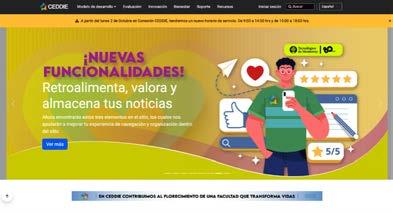
With the objective of keeping Tecnológico de Monterrey at the forefront of educational technologies to improve the experience of its teachers and students in the teachinglearning process, 46 educational technologies were evaluated in 8 categories; 11 were piloted and 6 are close to being implemented and integrated into the institutional ecosystem. Some of the categories of these technologies are: Technologies for engagement, evaluation, competency management, academic support and authenticity detection.
One of the most significant additions to the ecosystem was the design and enablement of a solution for the Curriculum Credentials strategy offered to students of the first generation of the Tec21 Model. It is detailed below.
To enable the strategy of the Evaluation and Alternative Credentials Center, regarding the granting of Curricular Credentials badges, a special experience was designed that involved the development of an “Institutional Achievement Manager” and the integration of technology to issue Curricular Credentials. Starting in July 2023, this manager will be in charge of storing the achievements, official recognitions, and information on credentials, diplomas and recognitions of all the students and graduates of the institution.
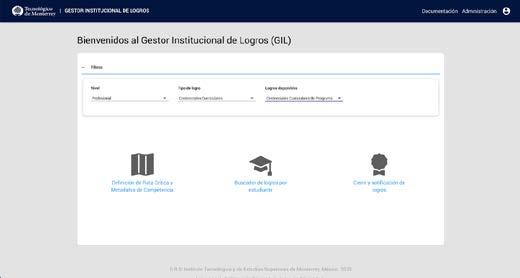

at Tecnológico de Monterrey. 2023 Report
The Immersive Learning Classroom with Extended Reality allows teachers and students to interact in a dynamic learning environment with active activities and classes, thus promoting the application of the knowledge acquired to develop projects and solve challenges. This innovative classroom offers each student the opportunity to “immerse” themselves in tangible knowledge, allowing them to work in an individual and collaborative way.
This year, 17 immersive resources were created, impacting:
763 Students-course
30 Teachers
11 Educational units
It should be noted that different special visitors were received, who were shown several of the most outstanding experiences, such as Virtual Reality and Mixed Reality through Hololens, or the Virtual Reality resource “Escape room Future Exploration”:
Dr. Jesús J. Rodríguez, National Director of the Medical Surgeon program, School of Medicine and Health Sciences, Tecnológico de Monterrey.
Dr. Daniel Badenes, Academic Secretary, National University of Quilmes, Argentina.
Delegation from the University of Alba, Chile.
Directors and representatives of Future Design Lab, Yadira Ornelas and Stuart Candy, Australian futurist and designer, associate professor of design at Carnegie Mellon University and director of the CMU Situation Lab.
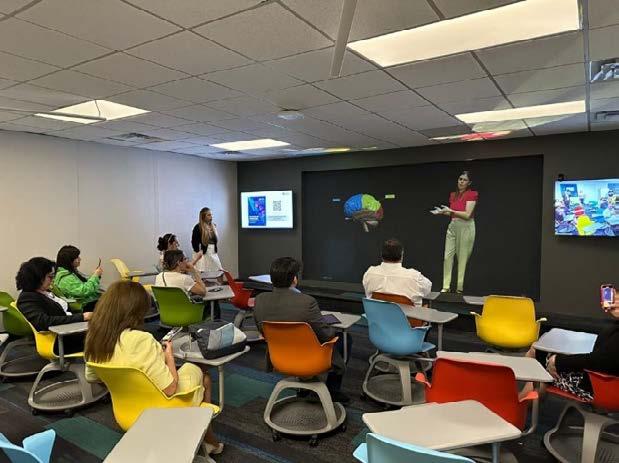
Monterrey, Saltillo, Laguna, State of Mexico, Mexico City, Santa Fe, Tampico, Chihuahua, Juárez City, Querétaro and Guadalajara; as well as 3 transmitting campuses: Monterrey, Santa Fe and Querétaro.
Strategy deployment
During this year, some of the innovations used to improve the delivery of classes were shared, through the use of hologram effect technology in various spaces and events.
Enabling spaces with the use of telepresence
Creation of a permanent space for telepresence projection in the House Museum of Don Eugenio Garza Sada.
The first class was taught where the 11 campuses of the Tecnológico de Monterrey were simultaneously connected, with Postgraduate students from the School of Engineering and
Architecture, Art and Design, and the School of Engineering and Sciences on the Querétaro and Monterrey campuses.
Participation in the Meeting of Advisors, of the Tecnológico de Monterrey, with a projection stand to show technology and the interaction between two people.
Journalist Paola Rojas was received for the recording of the program “Without prejudices”, where she interviewed two professors from the School of Engineering and Sciences: Dr. Carlos Astengo, leader of the Institute of Innovation for the Video Game Industry, and Dr. Lorena Martínez, Coordinator of the video game concentration at Tecnológico de Monterrey.
Reception of a delegation from Latin American institutions at the “Times Higher Education” event.
A special transmission was made through the “Professor with a hologram effect” as part of the opening ceremony of the 80th Anniversary of the Tecnológico de Monterrey.
An agreement was signed with the DUOC University (Chile) for the construction of the transmitting and receiving rooms in said institution, for the provision of classes with a hologram effect. A training workshop was held for the use of the “Professor with hologram effect”.
Participation through the hologram effect in the conference “Emerging technological transformations”, given by Mtra. Leticia Castaño Sánchez, leader of educational innovation, at the “1st International Education Congress: Innovating the futures of education”, at the Private Technical University of Loja (Ecuador).
“Professor with hologram effect” in numbers
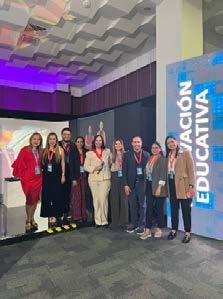
A conference was given for the Peru headquarters by Master Jorge Blando, Director of Continuing Education.
1,084 Students-course
33 Teachers
124 Educational units

11 Campus
Teaching indicators
59 Educational units
98 Teachers
In 2023, the Hall Immersive Room integrated new delivery strategies to facilitate and improve the proximity of teachers to students in an immersive environment, impacting more than 7,000 students in the different Professional, Graduate and Continuing Education programs. In 2023, more than 300 sessions were scheduled, taught by 98 teachers from different campuses, who attended this room to share their knowledge and hold talks with invited experts and training partners. In addition, students and teachers from foreign universities, partners of Tecnológico de Monterrey, attended.
The following are some of the new experiences taught from the Hall Immersive Room.
7,230 Students
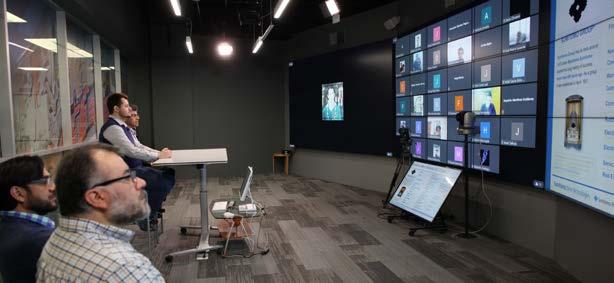
During the first week of the February-June 2023 semester, more than 1,000 students from different Undergraduate semesters had the opportunity to interact with their teachers, classmates and training partners, during the presentation of the challenges to be resolved in said semester.
The School of Engineering and Sciences, through the educational units “Materials and Manufacturing Analysis” and “Design of products subjected to static loads”, connected from India to: Janardhan Rao, Tool Fixture Design ETEC Manager; Alejandra González, Manufacturing Engineering Supervisor; Ana P. Treviño, Tooling Engineer; and Malhar Kulkarni, Tooling Engineer. They served as representatives of the training partner John Deere. The educational unit “Design of Machine Elements” was attended by Ángel Morales, representative of the training partner Sumitomo Drives Technologies.
The Business School taught the educational unit “Ideation and prototyping” from this room, where the following participated as representatives of the training partner: Jesús D. Morales, Deputy Director of New Technologies, Head Digital Hub Banca Afirme; and Nicolás Noriega, General Director of 24xoro. In a second session, the students were able to talk with Agustina Garavento, Brand Manager of the Hune corporate.
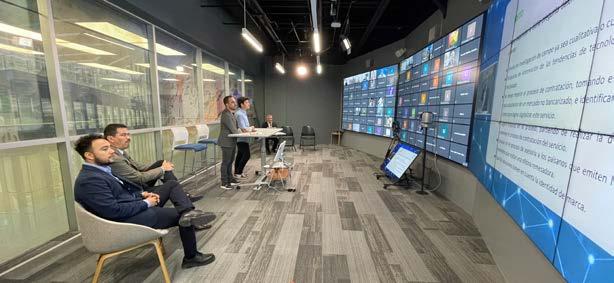
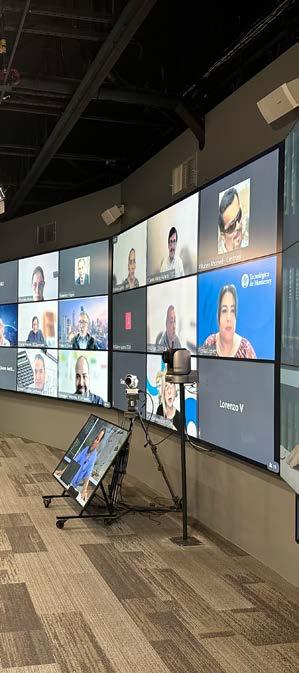
With the participation of 20 students from Thailand, Italy, Colombia and Mexico, the Workshop “The art and craft of scientific communication for collaborative quantitative research” was taught from the Hall Immersive Room. This belongs to the doctoral program in Engineering Sciences, of the EGADE Business School. The objective of this workshop was to develop collaborative skills in remote research, scientific writing (using the cloudbased LaTeX system) and oral communication through effective virtual presentations.
The workshop was given in the SeptemberDecember 2023 quarter, by Dr. Federico Trigos, and included the participation of renowned guest experts on the subject, such as: Mario Doria (Mexico); Margherita Peruzzini and Pietro Bianca (Italy); and Chadwick Holmes (USA).
In Week 6 and Week 12 of the Global Week program of the 2023 academic periods, in the educational unit “Diversity in a globalized world”, 798 students and 9 teachers from this national school had the opportunity to interact and collaborate with teachers and students from the Universiti Kebangsaan of Malaysia, the Catholic University of Salta of Argentina, the University of Notre Dame, and the Technological University of Colombia, as well as with notable guests on different topics.
at Tecnológico de Monterrey. 2023 Report
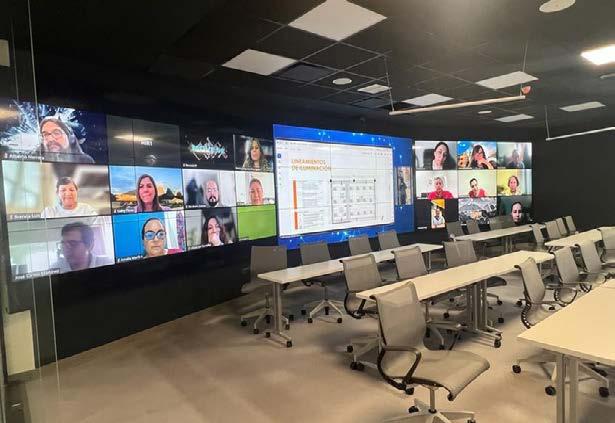
Finally, in September 2023, the Hall Immersive Room, located in the Habitat of the Future of Business building of the Business School, Guadalajara Campus, began operations as a space to hold synchronous sessions via videoconference. Thanks to the characteristics of this room, the teacher can interact with his or her in-person and remote students, living a unique experience by taking advantage of the panoramic view of 27 monitors that favor the creation of an immersive environment.
The student experience evolves towards alternatives for development and coexistence, without being limited to a physical campus. With this in mind, it is necessary to generate virtual and hybrid experiences as a new normal, personalizing the university life of each student. In 2023, Tec Virtual Campus, the academic metaverse of Tecnológico de Monterrey, had a great impact: 12,839 students participated in 191 academic activities, inspiring 258 teachers to train in the design of activities.
To date, complete classes have been held in this metaverse, at both High School and Professional levels. In conjunction with the Global Shared Classroom program, activities have been carried out with 13 universities worldwide.
Catholic University of Peru
University of Lima, Peru
University of the Andes, Colombia
Catholic University of Colombia
Javeriana University, Colombia
University of Chile
San Sebastian University, Chile
Central University, Chile
Duoc UC, Chile
Xavier University, USA
University of South Carolina, USA
University of São Paulo, Brazil
Cardenal Herrera University, Spain
Added to this academic experience is the offer of services to students, provided by Tec Services, Tec Media, Biblioteca Cervantina, and Talent Attraction, which serve students nationwide, expanding their possibilities of interaction in this digital space.
Without a doubt, today it can be said that Tec Virtual Campus is a philosophy, and not just a platform. The lessons learned, the experiences designed, the interactions generated, the openness of the Tec community to use the metaverse, is what really has value. That is preserved and transferred to the relevant educational technology.
To know the published articles referring to this topic, please consult Annex 1: Publications on educational innovation.
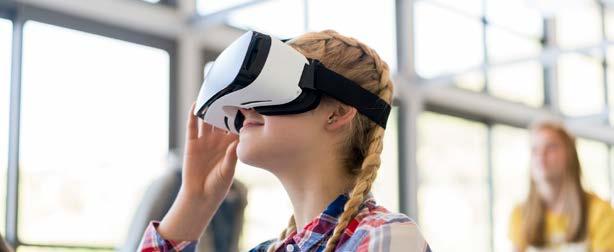
The Library seeks to bring the best learning content closer, as well as facilitate access to information, capitalizing on the use of educational technology. It offers an educational space designed so that students and teachers can carry out various digital learning experiences in an immersive environment with Virtual Reality technology, through a technological environment equipped to explore, study and/or carry out activities and tasks designed by their teachers. (as), for the development of skills in the various educational units.
During the August-December 2022 semester, four new VR Zones were deployed on the Chihuahua, San Luis Potosí, Saltillo and Toluca campuses, thus adding a total of 11 VR Zones nationwide.
By using Virtual Reality technology, students live educational experiences through one or different possibilities, this through exploration and discovery. The objective is for them to know and become familiar with the Virtual Reality information resources available. Through independent study, students will be able to prepare for their assessments, review content from their subject and acquire new knowledge. They will also collaborate in teams or small groups when joining a class to work on a topic guided by the teacher.
Finally, they will carry out academic activities around an exercise designed by their teacher, which can be part of the educational unit, with value in the evaluation of the subject.
Both students and teachers can freely use the VR Zone in the Library, when they observe available stations or through an electronic agenda that allows digital reservations to be made and ensure the availability of the stations (https://biblioteca.tec.mx/ inicio/zonavr).

The Global Shared Learning (GSL) initiative continues to grow and innovate, following the COIL (Collaborative Online International Learning) methodology. The GSL Classroom and GSL Week models continue to be appreciated by teachers and students at Tecnológico de Monterrey, as well as by their peers at international partner universities. Despite the reactivation of semester and intensive international programs, these two approaches were the key drivers of ‘internationalization at home’ for 16,392 students, of which 8,539 belong to Tecnológico de Monterrey and 7,853 are international students. Likewise, they played a fundamental role in the internationalization of teachers from both our institution and partner universities during this year, achieving a historic figure of 726 teachers, of which 351 are from the Tecnológico and 382 come from various academic institutions.
In 2023, two calls were made to invite Tecnológico de Monterrey teachers to send their proposals to carry out a GSL Classroom collaboration with a partner university, resulting in 318 collaborations with 92 universities from 18 countries.
This translated into a virtual international academic experience for a total of 14,416 students, of which 7,395 were Professional students from Tecnológico de Monterrey, and 7,021 were Professional and Master’s students from partner universities. To facilitate the international experience of these students, we have the collaboration of a total of 684 teachers, of which 324 belong to the Tecnológico de Monterrey and 360 are teachers from our collaborating universities.
This model is part of the Tec Week offer for Undergraduate students, of the Tec21 Model. During 2023, GSL Week was offered four times (two per semester). The week-long collaborations were carried out with 12 partner universities in 8 countries. This benefited a total of 1,976 students, of which 1,144 are Professional students from Tecnológico de Monterrey, and 832 Professional and Master’s students from partner universities; In addition, 42 teachers participated, of which 27 were from Tecnológico and 22 were from partner universities.

Tecnológico de Monterrey. 2023 Report
During the intensive summer period, 46 students were received for the iSummerMX 2023 itinerant program: 27 of these for the Global Business program, and 19 for the Mexican Culture Heritage program. The students come from 17 different universities, located in 9 countries.
The iSummerMX programs coincided with the five-week Tec 21 calendar, and their start and end were on the Mexico City campus. Additionally, the students studied, had LiFE activities and cultural visits in the cities that host the rest of the international campuses: Querétaro, Guadalajara and Monterrey, as well as Campus Puebla.
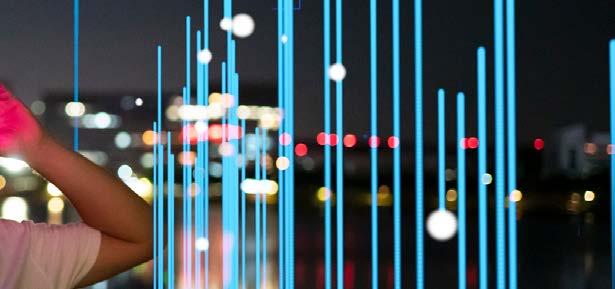
With the learning acquired in the pandemic, and keeping in mind the future of the institutional educational model and initiatives where the diversity of delivery modalities is already a reality, a digital transformation of the delivery experience of the academic software portfolio was designed. This new experience allows teachers and students to access the software at any time, anywhere and from a standard computer. This is how TecDigital Labs was born.
Some of the benefits and features of the project are:
Accompaniment: possibility of accompanying and advising the student in real time
Tracking: allows you to carry out guided activities by sharing your screen with students
Control: makes it easier to help students by taking control of their session in the cloud
Monitoring: allows you to know the progress of the activities that are being carried out through real-time monitoring
Flexibility: teachers and students have access to specialized software whenever they require it
Versatility: supports in-person, hybrid and remote modalities at the same time
Analytics: measures the use of specialized software in the cloud, for making academic and strategic decisions
Scalability: it has the capacity to adapt to the demand for the use of specialized software, according to the course programming of the period
Efficiency: allows savings in the renewal of computer equipment, adaptation of spaces and licensing


In 2022, the “Multiformat Digital Library” project was launched, which offers learning content beyond the text that enriches the students’ experience, and is aligned with the digital education strategy and the consolidation of the Tec21 Model. Taking into account that there are different learning styles, and that there has been an evolution in the way students learn and perceive the world around them, the Library seeks to satisfy these different needs or styles for learning through multi-format resources, such as such as: audio, video, immersive and virtual reality resources, and images.


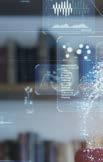








Additionally, with the commitment to improve the educational experience of students, the Library released a new Library Portal, with an innovative design and a new intuitive interface characterized by more efficient and easy-access navigation, with the objective of facilitate the process of discovery and search of information.
It is important to mention that in recent years the role of the Library in the teaching-learning processes has been consolidated, ensuring access to the bibliography required in the study plans with 70% in digital format, as well as access to unique materials that favor educational innovation.
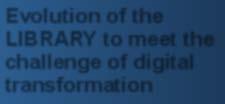
Greater flexibility in access to information resources, providing the student with options on how, when, and where they carry out their study and learning activities.
Impact
Students: 94,424
High School: 26,794
Undergraduate: 60,169
Graduate: 7,461
Teachers: 10,896
Researchers: 986
This initiative from the Institute for the Future of Education, encourages and promotes a culture of innovation among the faculty of Tecnológico de Monterrey.


Novus aims to transform education from the classroom, and to do so it empowers the teaching community so that they can develop and implement educational innovations in response to specific educational needs.
Every year, Novus launches an open call to fund educational innovation. An evaluation committee evaluates applications through a blind peer review process with a validated instrument. The selected project leaders live the Novus experience for over 18 months, during which they receive guidance and support on impact evaluation and project administration issues.
Development of skills that allow scaling the impact of educational innovations.








The Novus experience is a process that develops skills in the institution’s teachers, while ensuring successful implementations of educational innovation and the evaluation of its impact through experimentation. Thanks to collaboration with other institutional teams, an agile experience is enabled for teachers who participate in Novus.
During 2023, the selected projects were implemented and 50 educational innovation projects of the Novus 2021 generation were formally closed. The results are detailed as follows:




In 2023, 879 teachers from the institution participated (an increase of 14.5%, compared to 2022), who nominated 261 educational innovation proposals (an increase of 32%, compared to 2022).
After a process of evaluation, selection and budget review, the 55 projects that make up the Novus 2023 generation were selected with the participation of 204 teachers.
The initiative had a collaboration with Ruta Azul*, specifically regarding the topic “Education for Sustainable Development”, in which 6 projects participate.




The selected projects* correspond mostly to:
Region: 53% Central-South
School: 64% Engineering and Sciences
Education level: 80% Undergraduate
*Ruta Azul is a sustainability initiative of the Tecnológico de Monterrey.
Within the framework of the National Teachers’ Meeting, the teachers responsible for Novus projects with the best performance and greatest impact on educational innovation were recognized.
Of the generation of 2021 projects that successfully closed during the February-June 2023 semester, 6 obtained the best evaluation and 10 more were recognized for their good performance and impact.
The best evaluated projects, as well as those responsible, were the following:
Smart Feedback
Use of Artificial Intelligence for educational dialogue, aimed at transformation through a more effective use of emotional tones in the academic or business feedback process.
Lilia C. Rodríguez
Business School
Querétaro Campus
App for the stimulation, development and evaluation of competencies in sustainable development
App to promote learning and reflection, where students can learn about relevant and updated topics about sustainable development. It also has a board game for participants to complement their learning.
Martha E. Nunez
School of Architecture, Art and Design
Monterrey Campus
Tec 21 car assembler with Augmented and Virtual Reality
Platform that includes Virtual and Augmented Reality lessons, with two lessons of each, focused on two Mecano car models within the Mx_REP simulator.
Carlos A. González
School of Engineering and Sciences
Querétaro Campus

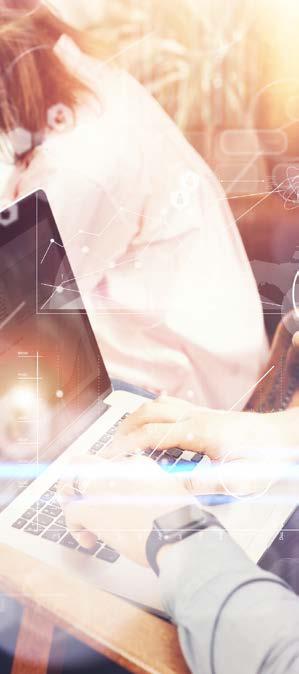
Growing Together Bank, personalized evaluation for the “Statistical Thinking (UFPE)” educational unit through Virtual Reality Software in Escape Room format, which simulates a work day in a bank. The experience includes a series of activities to be carried out with descriptive statistics; Upon completion (and immediately), the resource gives them a detailed report with feedback and level of skill development.
Gabriela Monforte Business School
Monterrey Campus
Mixed Reality Platform to improve the development of disciplinary competencies in the teaching of Control Engineering
Virtual environment in which a plant to be controlled is represented, with implementation practices of control techniques using Mixed Reality.
Alejandro Guajardo School of Engineering and Sciences
Guadalajara Campus
KUDI: financial game
A learning environment where the student experience the progress of their learning, as well as their financial competencies, through play.
Adriana Valle and Brenda Cruz Business School
San Luis Potosí Campus

Impact (2014 to 2023)
Page views: 24.6 M
Users: 14.1 M
Subscribers: 225,000
Followers on social networks: 500,000
In 2017 and 2021, Tecnológico de Monterrey obtained international recognition for its content. For more information, click here.
The Observatory is a unit of the Institute for the Future of Education (IFE) dedicated to the analysis and dissemination of the latest trends at the intersection of education, innovation and technology. Guides educators around the world in key areas of educational innovation through the production and distribution of open educational resources in English and Spanish. Through the different sections of its website, newsletter and social networks, a user can consult publications such as:
Edu News: most relevant notes and articles in the world of education
Edu Bits: pedagogical experiences and good practices in teaching (from teachers to teachers)
Edu Tube: the latest in educational innovation in video, webinars, interviews, conferences, among others
Edu Reads: reports, eBooks and readings on educational innovation and teaching strategies
Spanish Version
English Version

In the Spanish version of the site, the weekly newsletter in Spanish was named: “The main Latin American newsletter in education” by the Spanish educational magazine Espacios de Educación Superior.
Launch of the Edutrends Report - Lifelong Learning, which has been downloaded more than 7,000 times.
Collaboration with universities such as Universidad Oberta de Catalunya, and Pontificia Universidad Católica del Perú, among others.
Publication of webinars and panels with experts, a total of 8 per year.
Production of 8 podcasts with prominent women and men in the educational field worldwide, on topics of educational innovation, microcredentials, Artificial Intelligence, access to education, state of post-pandemic education in LATAM and the world, and equity in the workplace.
Edition and launch of the IFE Insights Reports, a series of reports aimed at decision makers: rectors, administrative staff of higher education institutions, directors of NGOs, directors of organizations such as UNESCO, educational policy experts, government officials, politicians/ministers /secretaries, researchers, think tank staff, among others.
The first published report was titled: Short-Cycle Programs: Effective responses to enterprises’ needs through educational innovation.
The report was developed by the IFE Observatory, for the Institute for the Future of Education (IFE), in alliance with Generation México, with the aim of making visible organizations that prepare young people in order to connect them with better jobs and opportunities.
In 2023, we presented to the international academic community a diversity of publications that highlight our commitment to educational innovation and digital education. These works reflect our application of advanced technologies to transform education, offering current perspectives on pedagogical approaches and digital platforms. Through research and practical experiences, we seek to guide educators and professionals interested in taking advantage of the opportunities of the digital age in education.

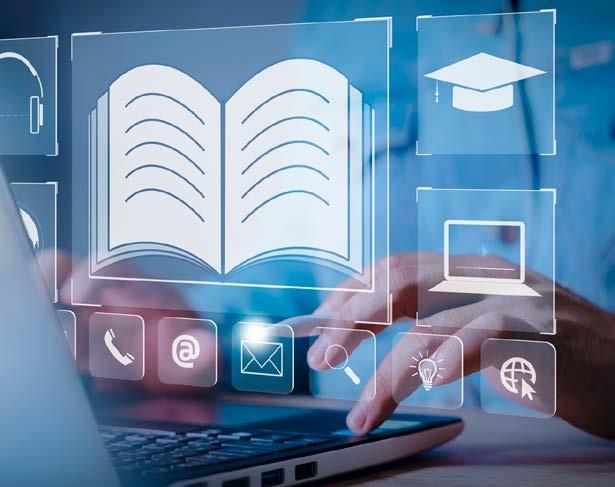
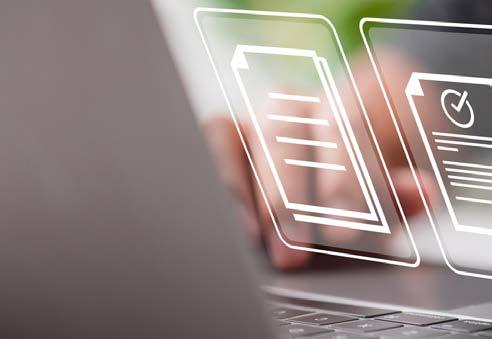
The following articles and papers were published and presented through peer-reviewed journals, digital media and national and international conferences.
Below is a list of publications and presentations.
Articles in peer-reviewed journals: 7
Articles in other media and for presentations: 17
Conferences: 18
Articles published in THE Campus: 27
To see all publications, go to Appendix 1.
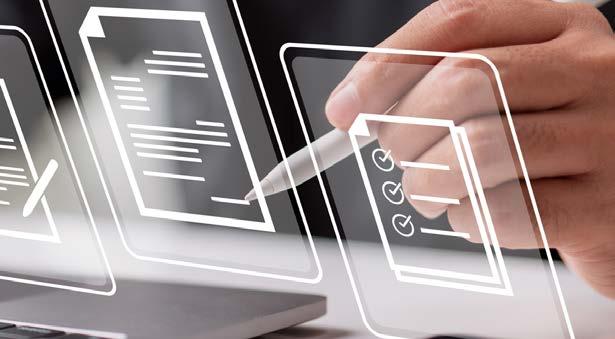
9.2 Acknowledgments
In recognition of their educational innovation, Tecnológico de Monterrey teachers were honored in various national and international forums for the development of innovative educational projects. The recognitions obtained are presented as follows.
Participants Campus Project Category
Lilia C. Rodríguez Querétaro Smart Feedback AI in Education Award
Romain Pouzou Querétaro
Elvira G. Rincón Monterrey
Jan Rehak Querétaro
Martha L. Velázquez Chiapas
Financial Iteration Method for Entrepreneurs Nurturing Employability Award
Gamit! Platform to manage gamification based on a rewards mechanic
Breakthrough Technology Innovation in Education
Entrepreneurship Program Innovation Project: Leveraging Technology to Foster Entrepreneurship Innovation in Business Education
Center for Social Innovation Sustainability Education Award
Participants School/Campus Project Award
Josefina Castillo
School of Engineering and Sciences, State of Mexico Campus
Interactive video on bacterial infection, with 3D and 360° modeling technique Second place
Participants
School/Campus
Brenda N. Santos LiFE, Monterrey Campus
Diego A. Oliva
School of Medicine and Health Sciences, Mexico City Campus
Carlos Agredano Business School, Querétaro Campus
Project Categories
Gamit! Reward system platform
Iyali M. Curiel
School of Engineering and Sciences, Cuernavaca Campus
Mario A. Caudillo
School of Architecture, Art and Design, State of Mexico Campus
Laura L. Salazar
School of Medicine and Health Sciences, Guadalajara Campus
Impact Transcendence Prospection Multiplier
First Student Research Day Impact Transcendence Prospection
Explor AR (Watch-LearnLive)
Impact Prospection
Promoting experience and learning in the concentration blocks on 4.0 systems and technologies through Master Classes and international experience Impact Prospection
Week 18. The journey of students from creative studies entry to becoming a true hero, enhancing their human flourishing Impact
Publication of article as a product of the course: Online education and dry eye disease during the COVID-19 pandemic
Impact Transcendence
Saul Montes De Oca
School of Engineering and Sciences, Toluca Campus
Fernando J. Ruiz
José M. Pardo
Sandra E. García
School of Engineering and Sciences, Toluca Campus
Implementation of the ABI strategy in the educational unit “Application of thermodynamics in process engineering” in the February-June 2021 semester Impact Prospection
Complementary mini-workshops for engineering students, for the acquisition of new skills outside the box
Impact Prospection Multiplier
School of Engineering and Sciences, Laguna Campus Challenge: Rocket Contest Transcendence
School of Engineering and Sciences, Morelia Campus
María G. Ortiz
Amaranta V. Jiménez
School of Engineering and Sciences, Monterrey Campus
School of Engineering and Sciences, Saltillo Campus
STEAM Challenge: “Engineering and sound art” for the educational unit “Modeling of Movement in Engineering” Transcendence
Xignux Challenge 2023. Educational innovation initiative aimed at promoting climate action (SDG13) Prospection
Revolutionary solids through 3D printers in the training of future engineers
Prospection
Gabriela M. Salazar
Business School, Monterrey Campus
Maritza Peña
Fabiola del C. Lima
Delia A. Galván
School of Engineering and Sciences, Toluca Campus
School of Engineering and Sciences, Laguna Campus
School of Engineering and Sciences, Monterrey Campus
Internationalization from home: Global Shared Learning Classroom. Mexico and Spain: linking education and business Prospection
Debating Tournament: Social Discussions from Mathematics Prospection
TEC 360 with multidisciplinary TEC21 approach Prospection
A didactic proposal for solving problems from socio-education Prospection
Elvia I. Rosas
School of Engineering and Sciences, Monterrey Campus
PSR App is MERA, a mobile application for iOS and Android devices. With this application, students will develop skills, with elements of Augmented Reality and Gamification. The app has a deck of preloaded questions for software engineering and design of an intelligent organizational system subcompetences
Prospection
Miriam I. Navarrete
High School, Tampico Campus
Learning French thanks to Artificial Intelligence Multiplier
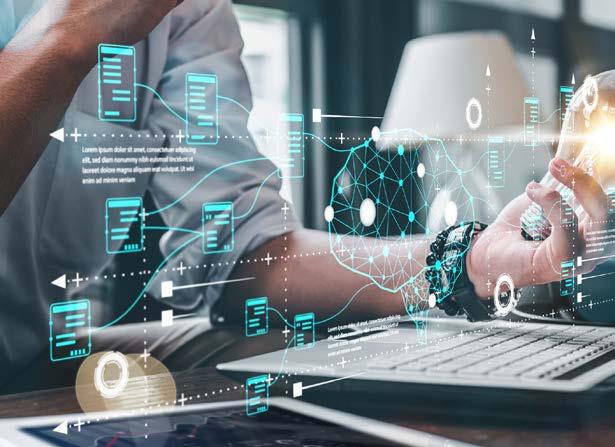
at Tecnológico de Monterrey. 2023 Report

This publication is in charge of the Directorate of Educational Innovation and Digital Learning, of the Vice-Rectory of Educational Innovation and Academic Regulations of Tecnológico de Monterrey.
Vice President of Educational Innovation and Academic Regulations:
Joaquín Alejandro Guerra Achem
Directorate of Educational Innovation and Digital Learning: Elsa Beatriz Palacios Corral
Directorate of Digital Learning: Maribell Reyes Millán
Directorate of Innovation of Learning Experiences: Laura Patricia Aldape Valdés
Directorate of Broadcasting and Content Channels: Norma Angélica Lara Uribe
Content editing:
Carolina Ramírez García, Verónica Alejandra Pérez Aguirre and Karla Verónica Cabrera Martínez
Data strategy: Carmen Verónica Ortiz Torres and Neidy Araceli Torres Zúñiga
Graphic design: Lucía Elizabeth Villanueva Vázquez
Editing, proofreading and translation: Perla Téllez Garza
Coordination: Ana Margarita Fuster Montiel
For their valuable participation in the development of content, editing and creation of the report, we thank:

Abigail Selene López Pérez
Abraham Israel Rea Ponce
Adriana Gabriela Gámez Garza
Alejandra Yaneth Sandoval Capetillo
Alejandro Alfonso Poiré Romero
Amairani Concepción Castañón Zárate
Ana Gabriela Pérez Cantú
Ana Gabriela Rodríguez Mendoza
Ariadna Bozada Cuesta
Armando Wilfredo Morales Guerrero
Beatriz Meléndez Venancio
Bertha Alicia Saldívar Barboza
Brenda Luis Chavira
Carlos Bejos Acebo
Cecilia Ivonne Rico Arenívar
Claudia Zubieta Ramírez
Claudia Erika García López
Dan Beltsasar Alonso Hernández
Dora Elizabeth García Olivier
Esteban Venegas Villanueva
Ever Vázquez Juárez
Francisco Javier Rosales Pineda
Homero Domínguez Perales
Hugo Luis López Coronel
Ingrid Gabriela Benavides García
Irving Hidrogo Montemayor
Jessica Jazmín Hernández Rodríguez
Jorge Alfonso Rodríguez Tort
Jorge Blando Martínez
Jorge Eugenio Valdez García
Jorge Limón Robles
José Antonio González Orta
José Luis Mata Fernández
José Vladimir Burgos Aguilar
José Rafael López Islas
Juan Pablo Nigenda Álvarez
Judith Aurora Ruiz Godoy
Laura Esther Zapata Cantú
Leticia Castaño Sánchez
Luis Enrique Portales Derbez
Luis Omar Peña Ortega
Luz Patricia Montaño Salinas

Ma. Elena Vázquez Lira
Manuel Indalecio Zertuche Guerra
Marcela Ivonne Rodríguez Rodríguez
María del Carmen Pámanes Fernández
María Eloísa Pérez González
Mariana Aguilar Vásquez
Mark Williams Wood Caballero
Martha Elena Moreno Barbosa
May Iliana Portuguez Castro
Miguel Ángel Nájera
Mónica Arreola Flores
Myriam Villarreal Rodríguez
Rafael Estrada Saldaña
Rebeca Elizabeth Alvarado Ramírez
Ricardo Gutiérrez Mercado
Roberto Iñiguez Flores
Rogelio Vicente Hernández Méndez
Sadie Lissette Guerrero Solis
Sandra Dennis Núñez Daruich
Vianney Lara Prieto
Wendy Lorena Páez Garza
We especially recognize the valuable participation of the professors who enriched their teaching through digital experiences, as well as all the areas that enabled the definition, design, development, and deployment of the successfully implemented projects, always to ensure the best experiences that add value to the learning of our students during their student life.
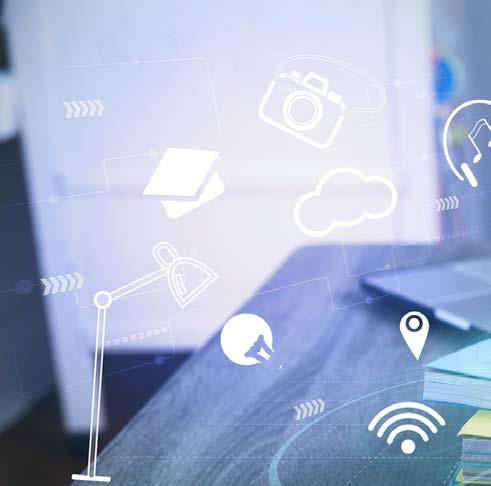

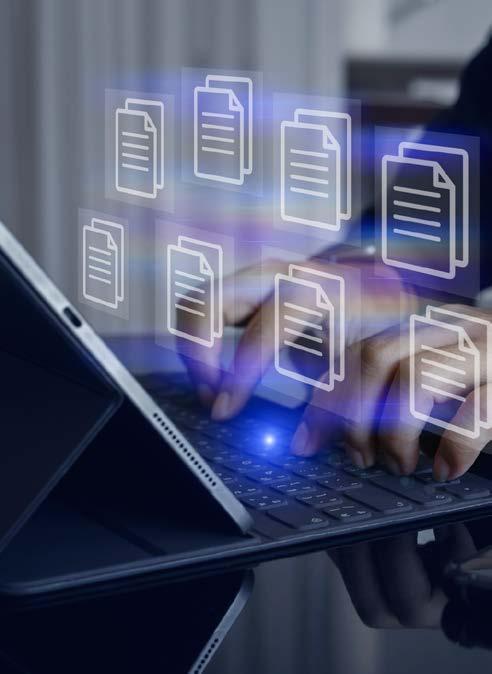
Aguirre Acosta, A. C., & Espínola Carballo, G. (2023). The Use of Immersive Tools in Higher Education: Escape Rooms. In Proceedings of the 2022 6th International Conference on Education and E-Learning. ICEEL 2022: 2022 6th International Conference on Education and E-Learning. ACM. https://doi. org/10.1145/3578837.3578848
Alanís, P. I. M., Márquez, R. E. C., González, D. C., Mendoza, A. G. R., & Muñoz, D. (2023). Analysis of the Impact of Virtual Reality on High School Students’ Learning in Nutrition Courses. In Proceedings of the 2023 Future of Educational Innovation-Workshop Series Data in Action: Digital Ecosystem and Emerging Tools for Education. IEEE. https://doi.org/10.1109/ ieeeconf56852.2023.10104668
Navarro-Durán, D., Félix-Herrán, L. C., MembrilloHernández, J., Craig, K. C., Ramírez-Cadena, M. J., & Ramírez-Mendoza, R. A. (2023). Active learning to develop disciplinary competencies related to automatic control in engineering curricula using low cost do-it-yourself didactic stations. Frontiers in Education (Vol. 7). Frontiers Media SA. https:// doi.org/10.3389/feduc.2022.1022888
Reyes-Millán, M., Villareal-Rodríguez, M., Murrieta-Flores, M. E., Bedolla-Cornejo, L., Vázquez-Villegas, P., & Membrillo-Hernández, J. (2023). Evaluation of online learning readiness in the new distance learning normality. Heliyon (Vol. 9, Issue 11, p. e22070). Elsevier BV. https://doi. org/10.1016/j.heliyon.2023.e22070
Reyna García, G. M., Ramírez Vásquez, N., & Puente Grimaldo, C. A. (2023). Improving Learning Experiences of Business Students in the Classroom Through Emotions in Higher Education. In Proceedings of the 2023 Future of Educational Innovation-Workshop Series Data in Action: Digital Ecosystem and Emerging Tools for Education. IEEE. https://doi.org/10.1109/ ieeeconf56852.2023.10104795
Tamayo Enríquez, F. A., Mosqueda Benavides, J. A., Aguirre Acosta, A. C., & Benavides García, I. G. (2023). The Impact and Outcomes of a VR Digital Plant for Enhanced Experiential Education across Academic Levels: Fostering High-Value Industry Competencies. In Proceedings of 2023 World Engineering Education Forum - Global Engineering Deans Council (WEEF-GEDC). IEEE. https://doi. org/10.1109/weef-gedc59520.2023.10343940
Zepeda, L., Benavides, I., Lopez, C., Roman, O., & Dominguez, Y. (2023). Guided Design Methodology for Activities that Integrate Generative Artificial Intelligence Tools in Education: A Pilot Study Promoting Ethical Use and Fostering Critical Thinking in Undergraduate Students. In ICERI2023 Proceedings. 16th annual International Conference of Education, Research and Innovation. IATED. https://doi.org/10.21125/ iceri.2023.1811
Tecnológico de Monterrey is a founding partner of the THE Campus initiative, of Times Higher Education (THE), which aims to exchange knowledge and experiences around technology-enhanced learning.
THE is a digital platform that has more than 3 million monthly visitors, which makes it ideal for integrating the expertise of universities and communicating it among the international community.
In 2023, Tecnológico de Monterrey participated by publishing 27 articles about experiences and best practices on the implementation of digital modalities and educational innovation in higher education. Access the publications here:
1. A good plan is essential to make online international courses a success
2. Seven ways to tailor your teaching for different class sizes
3. Using VR to break the ice in the classroom
4. Driving change: creating student-NGO partnerships for climate solutions
5. Seven steps to being a great teacher
6. Goodbye memorisation, hello open-book test
7. How to design and build microcredentials in four steps
8. Move student communication from passive to active using ‘I like, I wish, I wonder’
9. Practical tips to remember when designing activities utilising ChatGPT
10. Introducing the ‘virtual rally’ – a strategy for collaborative learning
11. Recommendations for using design thinking in the classroom
12. Four steps to design a course that motivates students and consolidates learning
13. A beginner’s guide to implementing new technologies in your classes
14. Effective feedback techniques for struggling students
15. Synchronous or asynchronous? When to use which when teaching online
16. A methodology to trigger social entrepreneurship ideas in your class
17. Develop the skills of the future through challengebased learning
18. Five steps for creating the ideal home office
19. Five key competencies for successful digital teaching
20. How to set up immersive VR lessons on your campus
21. Seven steps for successfully introducing adaptive learning
22. Cameras on: how to overcome a key challenge in digital courses
23. The library and the metaverse: a match made in heaven
24. Five ways to use neuroeducation to improve student learning
25. Strengthening academic integrity requires action from students and teachers alike
26. Diagnostic, formative or summative? A guide to assessing your class
27. Five tips for creating cheat-proof classes
For more information, visit: https://www.timeshighereducation.com/campus/institutions/tecnologico-de-monterrey-tec
15th International Conference on Education and New Learning Technologies, Edulearn 23, July 5, 2023. Palma, Spain.
Analysis of the Impact of Virtual Reality on High School Students’ Learning in Nutrition Courses, Generales, 10 de abril 2023.
Annual Meeting of the Millennium Project Planning Committee, Dubai, 25- 28 de noviembre de 2023.
Escape room “Future Exploration”: collaborative virtual reality for teaching Strategic Foresight, Ciencias Sociales, 10 de abril 2023.
Evaluation of a Virtual Campus Adapted to WebBased Virtual Reality Spaces: Assessments of Teacher and students.
Exploring the potential adoption of Metaverse for Higher Education: Structural Equation Modelling Approach in a Business School context.
Future Exploration Webinars. Collaborative Virtual Reality for training in strategic foresight. World Future Society- Mexico, October 5, 2023. Mexico City, Mexico.
How to set up immersive VR lessons on your campus, Transversal, 20 de marzo.
Imbricación del Metaverso en la complejidad de la educación 4.0: Aproximación desde un análisis de la literatura.
Motivation for Learning in Virtual Environments Journal of Social Science Studies, Ciencias Sociales, 10 de abril 2023.
IX JSVE 2023 and III ICEVS “Facing the Challenges of the 21st Century in Higher Education”, University of Valencia, June 6, 2023. Valencia, Spain.
Tec Virtual Campus, a metaverse for engineering learning.
The effect of a Virtual Reality resource on the engagement and learning experience of first-year engineering students, Escuela Ingeniería, 18 de abril 2023.
Transforming Higher Education Using WebVR: A Case Study.
Who is Who UNESCO Chair in Strategic Anticipation, Universidad Externado Colombia, September 12, 2023. Bogotá, Colombia.
Wow experience with immersive reality: Gamification in the Tec Virtual Campus.
XXV World Conference. Exploring Liminalities. Creating Spaces for Unlimited Futures. World Future Studies Federation. October 25-27, 2023, Paris, France.
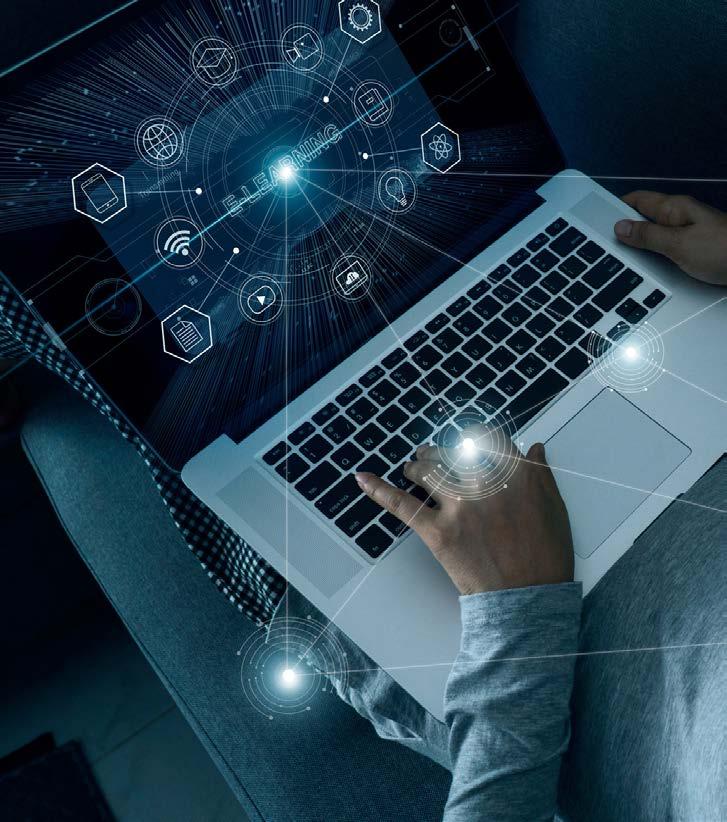
Vice-Rectory for Academic Affairs and Innovational Education, Tecnológico de Monterrey México, 2024
This resource is shared under the license Creative Commons Attribution: creativecommons.org/licenses/by/4.0
If you have any questions or would like more information, send us an email to: innovacioneducativa@servicios.itesm.mx
Or visit our digital space: innovacioneducativa.tec.mx